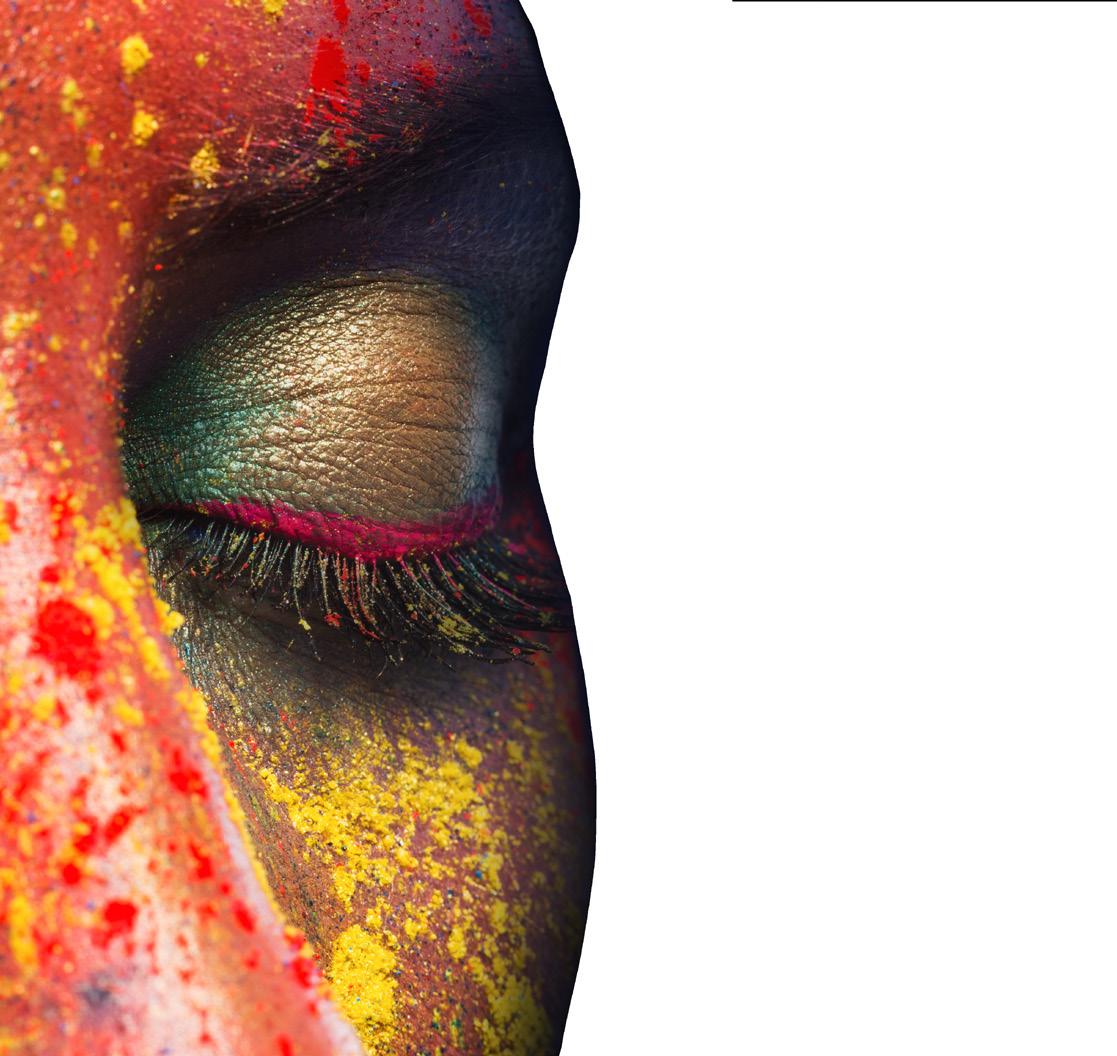

SEEDS OF CHANGE
INITIATIVES THAT CHANGED LIVES AND SITUATIONS OF WOMEN AND GIRLS IN KENYA, ETHIOPIA AND UGANDA

Acknowledgements
I would like to express my deepest appreciation to everyone who made the compilation of the “AWESOME Coffee Table Book” possible.
My heartfelt gratitude goes to our AWESOME partners, Women Challenged to Challenge (WCC), Federation of Women Lawyers Association in Kenya (FIDA-Kenya), Siiqqee Women’s Development Association (SWDA), Ethiopian Women with Disabilities National Association (EWDNA), Forum for Women in Democracy (FOWODE) and Womankind Worldwide whose five years of unwavering determination and commitment are beautifully reflected in the powerful stories of change they have shared. Their experiences are at the heart of this publication.
I extend special recognition to our talented writers, Muthoni Wahome, Arthur Okwemba, Ruth Omukhango and Faith Muiruri, who skillfully crafted these narratives and brought depth and context to the stories, creating a comprehensive picture of the AWESOME Programme’s impact.
I am deeply grateful to my dedicated colleagues at Womankind: Sally Akinyi, Mary Sirengo, Fiona Wilks, and Linda Kroeger, whose invaluable insights and collaborative spirit helped bring all the elements of this project together seamlessly.
Special appreciation goes to the Aksent design team, Peris Wangui and Joseph Waciira, for their exceptional work in creating the visual design that brings this book to life.
This project would not have been possible without the generous funding from the Dutch Ministry of Foreign Affairs (MFA) for the AWESOME Programme (2021-2025). I also acknowledge the broader Womankind team and the various consultants whose expertise and guidance shaped the materials referenced throughout this work.
To everyone who contributed to making this coffee table book a reality, thank you.
Yvonne Ndirangu
Project Manager – AWESOME Coffee Table Book

Foreword
The AWESOME Programme (Advancing Women’s Engagement: Strengthening Opportunities to Mobilise for Equality) presents The Coffee Table Book. This is a collection of stories from the three countries (Kenya, Uganda and Ethiopia) where the programme has been implemented over the last five years.
This book is a mirror of the struggles, victories, and ongoing journey of women and girls who refuse to be silenced. It is also a reflection of the solidarity of partners, communities, and donors who believe that real change happens when power is shared, voices are amplified, and justice is pursued with persistence and determination. By gathering these stories, we are reminded that narratives are powerful tools for change. They help us see the human face behind statistics, they connect us to lived realities, and they inspire us to act.
Over the past five years, Womankind Worldwide has partnered with five women’s rights organisations in Ethiopia, Kenya, and Uganda to confront two of the most persistent barriers to gender justice: sexual and gender-based violence, and the exclusion of women from leadership and decision-making spaces.
I extend heartfelt gratitude to our consortium partners, FIDA-Kenya, Women Challenged to Challenge (WCC), Forum for Women in Democracy (FOWODE) in Uganda, and Ethiopian Women with Disabilities National Association (EWDNA) and Siiqqee Women’s Development Association (SWDA) in Ethiopia whose dedication and leadership have been the backbone of this Programme.
We also acknowledge the women and girls who shared their stories with such honesty and bravery, often reliving painful experiences so that others might learn, grow, and be inspired. To our donors and allies, thank you for believing in the power of feminist partnerships and for investing in movement-led change.
As you turn these pages, I invite you to pause, to listen deeply, and to carry forward the lessons of courage and hope they embody. May these stories challenge us to ask hard questions, but also remind us of the possibilities that emerge when women claim their space and lead. May they inspire us to continue walking together partners, communities, and allies until every woman and girl can live free from violence and fully realise her leadership and potential.
AWESOME Programme
AWESOME strategies that impacted positively on women’s lives in Kenya , Ethiopia and Uganda .

that positively lives Ethiopia

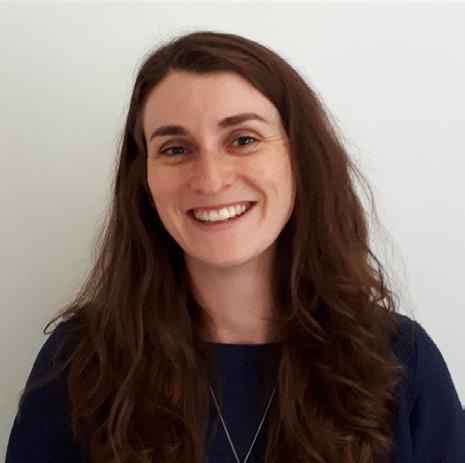
In 2019, a group of organisations converged in Nairobi, Kenya, to come up with strategies on how to strengthen Women’s Rights Organisations (WROs) and Disability WROs to play an effective role in advancing the inclusion of women in leadership and decision-making spaces, and in the prevention and elimination of Sexual and Gender Based Violence (SGBV) against women and girls.
Drawn from Uganda, Kenya, Ethiopia, and the United Kingdom, they had gathered to design a five-year programme to contribute to tackling these twin problems.
A consortium of six organisations, with Womankind Worldwide as the consortium lead, evolved, with the goal of empowering women’s
Fiona Wilks, Impact and Learning Advisor, Womankind Worldwide
movements to take the lead in tackling barriers to leadership and challenging drivers of SGBV. It was a leap of faith.
Strengthening the women’s movements and engaging in progressive campaigns such as #SafeAtWork, #SafeInSociety campaign, were identified as some of the key pathways to realising this goal.
The #SafeAtWork campaign was about supporting individuals, organisations, and networks to advocate for the ratification, domestication, and implementation of the International Labour Organisation (ILO) Convention 190 on Violence and Harassment in the World of Work. The Convention calls for measures to prevent, address, and eliminate violence and harassment in the world of work in order to make it safe for women.
But this campaign was just part of the broader AWESOME strategy to contribute to the realisation of women’s rights by influencing change at three critical levels:
Self: Supporting individual women to demand and advocate for women’s rights; Society: Challenging harmful gender norms and attitudes at the societal level; and Formal Institutions: Improving the legal and policy frameworks in formal institutions to advance the realisation of women rights.
These emerged as key pathways to addressing women’s rights, women’s leadership, and SGBV challenges. Working at all the three levels was key to creating safe and empowering spaces for women to thrive in leadership and to live free of violence.
In each of the three countries, creative interventions were pursued at each of these levels to increase women’s leadership and tackle SGBV during the programme lifespan.
At the individual, over 16,000 women in the three countries were supported with training
and awareness raising. This support inspired them to drive change within their communities and formal institutions, while at same time going out to seek leadership positions.
This was strengthened with interventions at the society level that reached over 42,000 people in the three countries with messages that challenged harmful gender norms and attitudes, tackled SGBV, and promoted women leadership.
But these changes at individual and society levels required formal institutions that were gender responsive, for women to fully enjoy their rights. In this regard, advocacy calling on these institutions to undertake legal and policy reforms that promoted women rights, including right to leadership and safe spaces, was done.
Change starts to happen
After five years of intervening at these levels, change started to happen.
“In Ethiopia, individual women and women’s groups in factories who had been capacitated by Siiqqee Women’s Development Association (SWDA) under the AWESOME programme engaged in advocacy around safe working environment and equal pay for equal work.”
Managers and owners of these factories were sensitised and trained on women’s rights. Combined with efforts from newly organised women’s worker groups, this helped negotiations for better working conditions and the factory managers began to respond to women workers’ rights.
Over five factory managers put in place measures that included increased safety for women, prevention of SGBV, and signing of internal labour union agreements.
In Kenya, Fiona Wilks, Impact and Learning Advisor, Womankind Worldwide notes, the work
of Women Challenged to Challenge (WCC) with the county governments contributed to major changes at the formal institutional level, where they were able to influence the integration of issues affecting people with disability into the policy and budgetary plans of the counties.
For instance, WCC collaborated with Kilifi County to formulate their GBV policy. Today, the policy has helped to increase access to care and improved the quality of services offered to survivors of SGBV in public institutions. Similar efforts bore fruits in Makueni County, where persons with disabilities policy was developed, thanks to the advocacy and massive awareness on women rights.
Centrality of the media in promoting women leadership
Partners worked with community elders and media houses in Uganda, Kenya, and Ethiopia to challenge and change social norms around women’s leadership and SGBV.
“Individual journalists and their media houses pro-actively gave more airtime and space to stories that highlighted the value women with disabilities bring to the socio-economic and political spheres in the society. Such stories started to challenge stereotypes about women with disabilities.”
In Uganda, the work of Forum for Women in Democracy (FOWODE) with the media and community helped to have positive attitudes about women leadership and their role in society. The media used key days such as International Day of Decent Work to sensitise and empower communities on the rights of, and value of women with disabilities in the society.
Slowly, this sustained advocacy started to have an effect, with women with disabilities noticing positive change in attitudes among fellow community members about them.
Such media accomplishments were not happening in a vacuum. At the beginning of the AWESOME programme, observes Sally Gift, Communications Manager, Womankind Worldwide, the communication team had shepherded the development of a Strategic Communication Plan to guide all the programme’s communication matters. It is this strategy that contributed to the successes recorded by the programme at the national, regional, and global levels.
A challenging journey
These encouraging results that have brought meaning in the lives of thousands of women and girls in the three countries were not free of challenges.
The political and socio-cultural context in Kenya, Uganda, and Tanzania posed major challenges to the implementation of the programme, in some cases, reducing the speed at which results were achieved.

Yvonne Ndirangu, Communications Officer, Womankind Worldwide
Yvonne Ndirangu, Communications Officer, Womankind Worldwide, observes that the shrinking civic space and political situations in some of these countries made it difficult for certain things to happen. In Ethiopia, AWESOME partners and rightsholders were unable to participate during the International Twitterthon on the International Day of Decent Work due to restrictions on social media spaces.
In Uganda, limitations on social media space and threats to bloggers made it difficult to get influencers to speak about key issues in their communities.
Challenges were also experienced in Kenya where there is push-back on women rights and gender equality, with a new narrative emerging about women not providing quality leadership.
Learning opportunities emerge
Despite these difficulties, the AWESOME journey gave the implementors an opportunity to learn and reflect on a number of issues that will inform the design of similar programmes in future.
One such lesson was programming around disability inclusion, especially in ensuring the rights of women and girls with disability are fully integrated in the social, economic and political systems of their communities.
According to Wilks, the design of the AWESOME programme, with the organisations in the partnership recognised as experts in their areas of operation, was a source of great learning as it enhanced the effectiveness and efficiency with which the programme was implemented in the three countries.
So was the flexibility and duration of the programme. AWESOME team learnt that flexible funding, which is long-term, provided better results than when the design is otherwise.
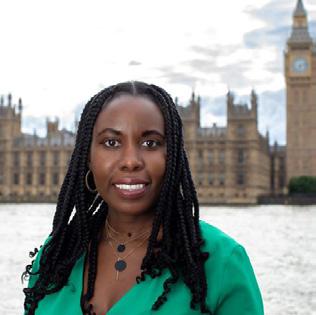
Similarly, adds Gift, a well-designed communication and media strategy that emphasize the centrality of media in changing attitudes, challenging gender norms, and traditions that disempower and marginalise women, is crucial in attaining objectives of gender equality and women empowerment.
Sally Gift, Communications Manager, Womankind Worldwide
Power of a strengthened women movement
When the AWESOME programme takes stock of its success in Uganda, Kenya and Ethiopia, one area that will feature prominently is the positive advances the programme recorded in strengthening women movement to push for women rights.
This was demonstrated in the strong collaboration between AWESOME partner organisations, who reinforced and strengthened each other’s work around women leadership and elimination of sexual and gender-based violence.
In Kenya, for instance, FIDA-Kenya worked very closely with Women Challenged to Challenge (WCC) to increase the understanding of disability rights and the legal frameworks that protect them.
In Ethiopia, Siiqqee Women’s Development Association (SWDA) and Ethiopian Women with disabilities National Association (EWDNA) collaborated in mobilising other women rights movements to speak with one voice on the rights of women; especially in pushing Ethiopia to ratify International Labour Organisation Convention 190.
Women workers in factories, for instance, have been mobilised to form groups that are now on the forefront agitating for women rights at the work place.
This is evidenced by change in policies and practices, with factories in Ethiopia adopting safe working spaces, especially for women workers.
Inter-country collaborations between AWESOME partners on how to influence global discourse on women rights too produced positive results. This was exemplified in the working relationship between FIDA-Kenya and FOWODE in Uganda
While these collaborations were part of the design of the AWESOME programme, its implementation produced some unexpected results. At the onset, AWESOME programme was designed in such a manner that partners rotated roles. One of these roles was holding of annual partners meeting.
The approach was so rewarding to partners who had not hosted an international meeting. Recalls Fiona Wilks, Impact and Learning Advisor, Womankind Worldwide:
“This arrangement was very impactful, influencing how organisations conducted their business. It offered each of our organisations opportunities to grow and gain confidence to engage.”
AWESOME advocacy pays off in advancing women rights in three African countries.
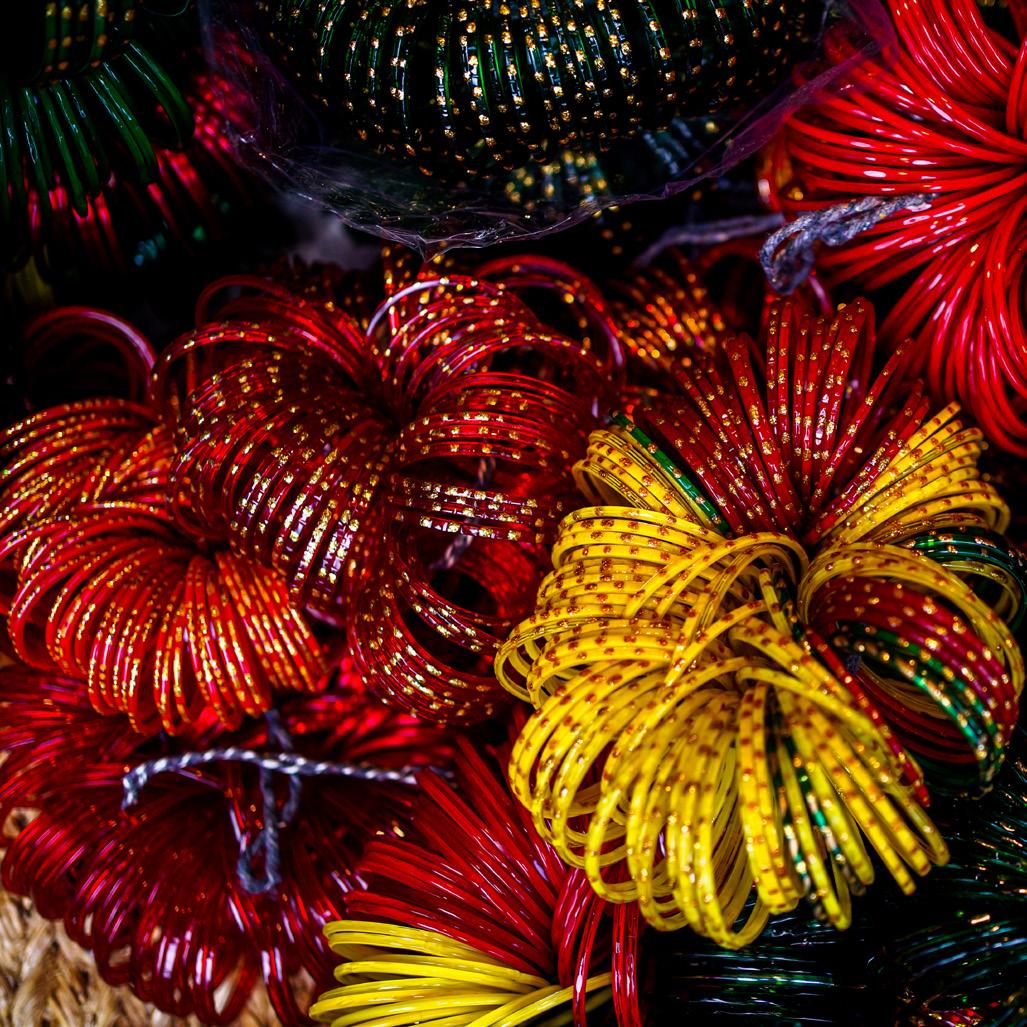

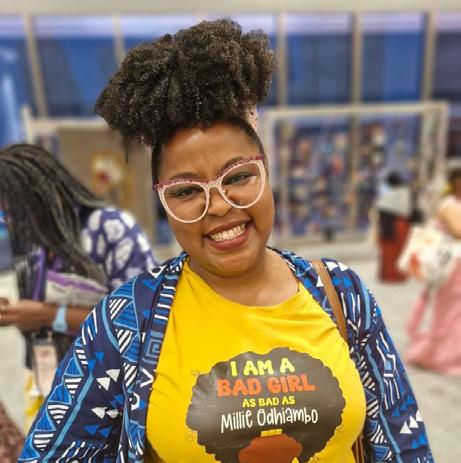
When the Advancing Women’s Engagement: Strengthening Opportunities to Mobilise for Equality (AWESOME) programme was formulated, the framers of the initiative knew engaging in progressive advocacy at the national, regional, and global levels was crucial for realisation of gender equality.
This was back in 2019 when conversations of how this advocacy would look like in Kenya, Ethiopia, and Uganda, started to take place.
It was agreed that advocacy focuses on two areas: promoting women leadership and participation in decision making and combating Sexual and Gender-Based Violence (SGBV).
“Our work as Womankind Worldwide was to support and work closely with our consortium partners to engage in regional and global policy
Linda Wanjiru Kroeger, Policy and Advocacy Manager, Womankind Worldwide.
advocacy around these two key areas of the programme focus,” says Linda Wanjiru Kroeger, Policy and Advocacy Manager at Womankind Worldwide.
Using advocacy as a strategy to tackle challenges around women leadership and participation in decision making, and high levels of SGBV in Kenya, Uganda, and Ethiopia, the programme was designed to affect two levels; Influence policy and legal changes at the national level; and shape conversations on the global scene on how to make the world a better place for women and girls.
This world included the workplace and leadership spaces where women were finding it very difficult to flourish and enjoy equality in decision making and leadership across all facets of their lives.
In 2023, the AWESOME programme launched one of the biggest #SafeAtWork campaign on the African Continent to make the place of work safe for women. The campaign advocated for tackling of policy and legal gaps at the national, regional, and global levels that made the workplace unsafe for women.
Campaigning for the ratification and implementation of the International Labour Organisation Convention 190 in Uganda, Kenya and Ethiopia was one of the #SafeAtWork, #SafeinSociety interventions. The Convention recognises the right of everyone to a world of work free from violence and harassment.
According to Wanjiru Kroeger, the programme used all the advocacy channels to get Kenya, Uganda, and Ethiopia governments to ratify this treaty.
Power of advocacy
It worked. Uganda ratified the ILO C190 in August 2023, thanks to the work of Forum for Women in Democracy (FOWODE) and other partners as part of Uganda’s women’s rights movement, who
engaged in aggressive advocacy to get Uganda to do so.
In Kenya, AWESOME partners were part of the joint memorandum submitted by Kenya on the ILO C190 ratification via the Office of the President’s Women’s Rights Advisor and the Ministries of Labour and Gender.
President Willian Ruto, in May 2025, committed to, and directed the Attorney General to expedite the ratification of the C190 treaty by Kenya. For Wanjiru Kroeger, this was a major success for the AWESOME programme.
At the African regional level, encouraging developments were also happening. The AWESOME partners led by Womankind Worldwide, were allowed to read joint statements to the African Commission on Human and Peoples’ Rights, during the Commission’s 77th Session in October 2023 in Arusha, Tanzania, and 81st Session in October 2024, Banjul, The Gambia.
The joint statements outlined the critical challenges faced by diverse women and marginalised groups, including persistent discrimination, violence, and restricted access to civil, political, economic, social, and cultural rights,” notes Wanjiru Kroeger. They also spoke to the widespread instances of gender-based violence, child marriage, and female genital mutilation in Kenya, Uganda, and Tanzania.
More importantly, the statement recognised the intersection between Violence Against Women and Girls and Women’s Leadership. This is very critical since violence has been weaponised to deter women from participating in leadership and decision-making spaces.
It called on African Union Member States to enact and enforce legal, policy, and institutional reforms that advance the rights of women.
“These
included ratifying international treaties like the ILO C190, safeguarding civic spaces, promoting women’s leadership, and addressing systemic barriers to equality. The overarching goal being to ensure human rights, dignity, and justice for all African women and girls in their diversity.”
“Our work as Womankind Worldwide is to facilitate our partners, by shifting power and resources, to amplify the work they are doing in their countries to global conversation and processes,” she adds.
True to this, AWESOME partners were able to engage in regional and global conversations to not only influence what happens at these levels; but to also work in solidarity and engage with feminist movements from other countries.
One of the global platforms where such engagements happened was at the 68th Session of the Commission on the Status of Women (CSW) that took place in New York in March 2024.
The consortium held a parallel event called “#SafeAtWork, Safe at Society: Affirming
Women’s Economic Rights through the ILO 190 Convention”.
The event showcased the experiences and strategies Women’s Rights Organisations (WRO’s), and Disability Women’s Rights Organisations (DWRO’s) are using in advocating for the ratification and adoption of the ILO 190 Convention.
Engaging
globally, acting locally
During the session, the AWESOME partners presented the ILO 190 Campaign Toolkit, an advocacy guide developed by the consortium to support individuals, organisations, and their networks in advocating for the ratification, domestication and implementation of the Convention. They also established new networks and partnerships.
“Ethiopian Women with disabilities National Association (EWDNA), for instance, was able to secure a new partnership with International Women Peace Group, a Korea-based organisation with whom they have now signed a memorandum of understanding for future collaboration around participation of Women with disabilities in peace processes.”
The organisation’s attendance at the World Disability Rehabilitation Conference, a global platform that brings together experts, researchers, policymakers, advocates and disability justice organisations, further helped it to bring Ethiopian perspectives to international advocacy spaces.
Women Challenged to Challenge (WCC) on the other hand was able to amplify and ensure issues of disability justice were on the agenda of the Beijing +30 regional coordination conference in Addis Ababa, Ethiopia. This inclusion has helped to situate Women with Disabilities (WWD) across the three countries as active participants in leadership and decision-making spaces.
Wanjiru Kroeger is delighted that the participation of consortium partners in these international fora and events had ripple effects at the national level.
In Kenya, for instance, advocacy by FIDA-Kenya and WCC saw an increased number of women, including those with disability, participating in political leadership.
In Ethiopia, advocacy work of Siiqqee Women’s Development Association (SWDA) in Export Processing Zones influenced the formulation of measures that increased the safety of women workers. While in Uganda, efforts by FOWODE contributed to increased commitment to gender sensitive budgeting.
To sustain these transformative work, AWESOME hired fundraising advisors to work with each consortium partner on means and ways of sustaining this advocacy and its attendant results during and beyond the life of the AWESOME consortium.
Challenges impacting advocacy work
While advocacy helped to contribute to these successes, it faced its own challenges. The shrinking funding for advocacy work on critical women rights issues remains a major challenge.
The restrictive political and civic space in Uganda and Ethiopia, that made it difficult for effective advocacy to happen; and the difficulties in financing advocacy work at regional level, where there is an interplay of complex issues, were the other challenges the AWESOME programme encountered.
Wanjiru Kroeger feels despite these challenges; the programme offered them a learning opportunity. One of this was the power of organised and goal-orientated partnerships.
“By joining forces with different organisations and stakeholders, it became possible to amplify our voice, share resources and expertise, and achieve better outcomes. The case of the ILO C190 campaign is a good example.”
Helping women rediscover their leadership potential was another one. Notes Wanjiru Kroeger: “This is especially important for WWDs who do not see themselves as potential leaders, especially where there are few WWD role models. Training and encouraging women to take up leadership roles should be an important part of a programme of this nature.”
Taking women rights campaign online
As AWESOME partners engaged in offline spaces to influence positive policy changes that advanced women leadership and addressed sexual and genderbased violence; they were also making great presence on online platforms.
A massive Twitterthon campaign undertaken on the 7th October 2024 during the World Day for Decent Work, was one of them. The campaign was to rally governments of Kenya, Ethiopia and Uganda to ratify and implement the International Labour Organisation (ILO) Convention 190 (C190) treaty on ending violence and harassment of women at workplaces.
The Twitterthon garnered close to 20 million impressions; with many of the tweets calling on the ratification of ILO C190.
“Today is the International Day of Decent Work, and for me, decent work is not just about having a job; it’s about having a SAFE job #SafeAtWork #RatifyC190,” Monchary tweeted.
Added Bravin Yuri: “Women with disabilities are not treated equally and are greatly discriminated against even when they report cases of sexual harassment because of the perception that they are asexual hence, nobody can harass them. This makes them more vulnerable to abuse. #RatifyC190 #SafeAtWork.”
While Janet Machuka tweeted: “To all workers, I hope you feel safe at your workplace, especially women. Let’s keep championing ending workplace harassment and violence. #SafeAtWork #RatifyC190.”
In Ethiopia, the tweets highlighted the sexual harassment of women working in coffee and flower farms.
“We underscored that while these sectors are our focus, the conversation should look into all sectors where women are engaged to ensure comprehensive workplace safety and protection,”
says Twitterthon report on Ethiopia campaign.
The tweets highlighted the unsafe conditions for women across various professions in Ethiopia, calling for urgent measures to address the situation.
“The Tweets strongly urged Ethiopia to ratify and implement ILO Convention 190 both in English and Amharic, framing this as essential for ensuring dignity and protection for all workers,” says Ethiopia report.
In Uganda, Zengwe Hub worked with Ugandan amplifiers, who have a following in excess of 11,000 on X (formerly Twitter) platform, to speak about violence and sexual harassment at work place, and pressure the Uganda government to implement C190 treaty it ratified in 2023. The Twitterthon gathered over 20,000 impressions.
“The Twitterthon triggered an important conversation around violence and harassment at Work in the Ugandan online spaces. I hope that the amplifiers who we engaged will carry the message of decent work forward to push for the implementation of the ILO C190,” says Prudence Nyamishana, Team Lead Zengwe hub.
From the perspectives of partners: How AWESOME interventions touched lives in Kenya

perspectives touched Turning women with disabilities into change agents
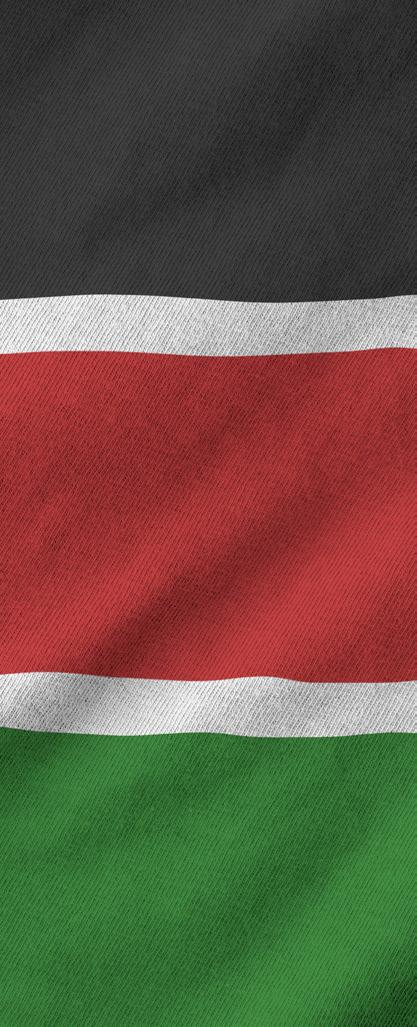
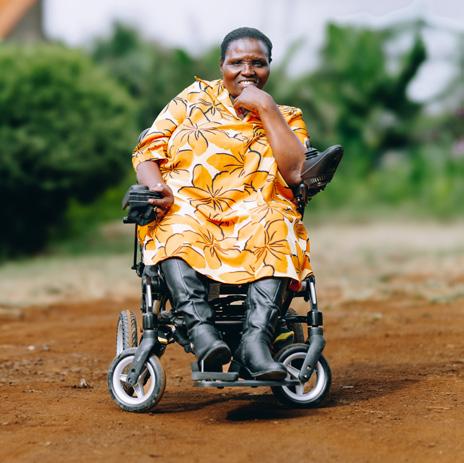
For many years, they had suffered in silence, with very few in their communities, or even families, giving them a chance to succeed in life.
These are women with disabilities from 20 counties in Kenya, who have endured exclusion from many important processes in the society.
But the future started to look brighter when Women Challenged to Challenge (WCC) showed them that they could have dreams and achieve them. This changing of mindset and imparting of skills on how to transform their lives, involved a series of interventions.
Jane Kihungi, Executive Director, Women Challenged to Challenge (WCC)
Significant changes started to happen when WCC received support from the AWESOME programme to advance leadership and other rights of women with disabilities. The first thing the organisation did was to train dozens of women with disabilities from 20 counties in Kenya.
These capacity building sessions focused on improving the knowledge and skills of the women with disabilities on how to participate in leadership positions and decision-making structures.
The women were drawn from Kajiado, Baringo, Nairobi, Siaya, Kisumu, Kakamega, Busia, Vihiga , Nakuru, Meru, Machakos, Makueni, Kiambu, Kilifi, Mombasa, Garissa, Taita Taveta, Nyandarua, Kisii and Murang’a counties.
Through a series of trainings, conscious raising, movement building, and creating spaces for women to share experiences, results started to emerge. Majority of the women with disabilities who were trained offered themselves for both elective and nominative positions.
“Scores of women with disabilities joined political parties while others hold positions at the community level where they have been able to hold governments to account and improve delivery and access to essential gender responsive services for their peers,” says WCC’s Executive Director Jane Kihungi.
These initiatives helped to strengthen the capacities of women with disabilities to take up leadership positions at the national and community level.
“We worked with the Kenya Women Parliamentary Association (KEWOPA) to build the leadership skills of women with disabilities in order to effectively represent their interests and issues in political spaces.”
These impressive developments started to happen in 2021 when WCC became part of the AWESOME Programme consortium.
In addition to the capacity interventions, the organisation studied county level legislation with a view to make them more inclusive. “We were targeting 20 counties with a view to ensuring that their policies on GBV were not only inclusive but, also addressed the needs of SGBV survivors holistically.”
The idea was to make both County Executive wing, County Assembly and the community aware of the rights of women with disabilities. These included protecting them from SGBV that was deterring many from pursuing leadership ambitions.
“During our initial engagements with the community, we realised that gender-based violence among women with disabilities at the community level was still very high. However, nobody talked about it.
Even the people who had been abused did not have the courage to come forward and speak. That is when we reached out to the county government to formulate policies to enhance the protection of survivors as well as emphasising on community awareness.
Initiatives start to pay off
These interventions by WCC started to pay off. Tens of women with disabilities came out to vie for different elective positions during the 2022 General Election.
“We had 50 women with disabilities seeking elective positions during these elections. This was the highest number we have ever had.”
Alice Munala, the programmes manager at WCC, says two women managed to win seats in Kiambu and Baringo counties as members in their assemblies.
Though few won compared to those who vied, the participation was significant. It sent a strong message that women with disabilities are able leaders. It also inspired those who did not make it to express interest in contesting again in the 2027 General Election.
The 2022 elections were indeed a turning point for many women with disabilities. It pricked their political consciousness. Many have since become members of political parties. They are now chairpersons or members of disability leagues within the political parties.
“The moment our members join a political party; they push for the formation of disability leagues. They also push for the adoption of inclusive policies. I know of political parties that have revised their constitutions to include persons with disabilities,” Munala says.
This show of ability has changed the perceptions of county governments and communities on women leadership and response to SGBV.
WCC, for instance, worked with Kilifi County to formulate their GBV policy. Today the policy is a working document which has helped to increase access to care and improving the quality of services offered to survivors of SGBV in public institutions.” Similar efforts bore fruit in
“We had 50 women with disabilities seeking elective positions during these elections. This was the highest number we have ever had.”
Alice Munala, Programmes Manager, WCC
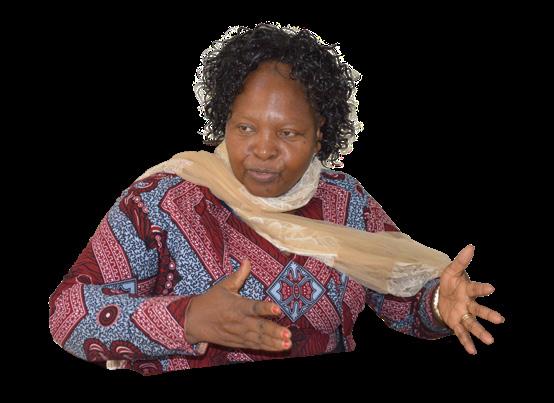
Organising to influence decisions
At the community level, scores of women with disabilities now sit on different committees responding to community issues. “We now have meaningful representation of women with disabilities in a range of decision-making spaces, among them the Court Users committees, health committee, hospital committees, and various school boards.
Kihungi says the women with disabilities have established networks to help them consolidate and safeguard the gains they have made so far. “In counties like Nakuru, Siaya and Kajiado, we have vibrant networks for women with disabilities, thanks to the AWESOME Programme. Women with disabilities are now talking in one voice and they are being listened to.”
“We have seen women with disabilities using these networks to engage the county governments in a structured manner. In Meru County, for instance, they have been able to lobby for the establishment of the Persons with Disabilities Board. A number of them currently sit on that board.” In Garissa, Women are speaking out against FGM in open barazas something that has never happenned before.
Munala explains that the Board has established a Fund for persons with disabilities who can now borrow loans to finance their businesses.
These networks also speak to political leadership. To assist in coordinating their activities, WCC established a national network for all the women who are interested in politics. The network comprises women with disabilities from the 20 counties.
“We have a WhatsApp group where women with disabilities mobilise around critical governance issues, and create linkages with organisations that continuously build their capacities. These platforms have also become essential for expanding outreach and sustaining momentum to push duty bearers to account.”
On the global stage, WCC has also been able to take women with disabilities to share their stories and influence global policies and narratives. “We have been able to participate in Commission on Status of Women meetings in New York and share our lived experiences in those spaces.”
Approaches used to deliver these results
These impressive results were achieved as a result of strategic interventions undertaken by WCC, using funding received from the AWESOME programme. One of the interventions adopted was the use of a multi-sectoral approach to drive changes both at the county and the national level.
Munala explains that WCC facilitated dialogues between government officials and representatives of the National Council for Persons with Disabilities to raise awareness regarding SGBV among women and girls with disabilities, as well as the role played by duty bearers in preventing and responding to such violence.
“WCC brought on board police officers, chiefs, Nyumba Kumi committees, health care providers, Ministry of Education and Ministry of Gender officials to discuss the rights of women with disabilities.”
The organisation reached out to the Independent Electoral and Boundaries Commission (IEBC), the Office of the Registrar of Political Parties and the leadership of political parties on the situation and rights of women with disabilities who were participating in competitive politics. The meetings were aimed at creating a conducive environment for the women with disabilities who were seeking political positions.
At the legislative level, WCC also worked closely with the Kenya Women Parliamentary Association (KEWOPA) to push for the Amendment of Disability Act, 2003.
“We wrote a memo to the women parliamentarians to ensure that our voices were captured in the final law. We now have a more inclusive law which received presidential assent in 2025.”
This partnership with KEWOPA offered WCC an opportunity to represent women with disabilities during the developed of KEWOPA’s strategic plan. “Our participation was to ensure that the inclusion of women and girls with disabilities is in KEWOPA’s vision and mission. This includes mentoring girls with disabilities in various constituencies.”
At the county level, WCC has worked with the FIDA Kenya project to train paralegals. In Nakuru County, for instance, the trained paralegals now have the capacity to identify, refer and advise SGBV survivors.
While at the community, WCC worked closely with the media to create awareness on the rights of women with disabilities, and mobilise communities to vote them into leadership
Dealing with challenges
These many successes also experienced some challenges, with the biggest being the high and unrealistic expectations from the communities. This included: Desperate mothers bringing their children with disabilities to the WCC meetings even without being invited, seeking help for their children.
Women who vied for political seats wanted WCC to finance their campaigns, which was not possible at the time. While in counties such as Garissa, the elders drove WCC away when the organisation requested them to participate in the formulation of an anti GBV law.
These success and challenges have helped WCC to learn one important lesson: that continuous engagement with stakeholders, and building partnerships, is very important in achieving results and bringing meaningful changes in the lives of women with disabilities.
FIDA-Kenya’s fight for women’s leadership and justice
When FIDA-Kenya launched public town hall meetings, university forums, and regional barazas to address the systemic exclusions of women in political participation and runaway cases of sexual and gender-based violence, it never occurred to many people that a movement to advance women rights was being born.
This coalition of individuals and organisations has evolved into a national movement that is rewriting the narrative around gender justice one strategy, one policy, and one woman at a time.
FIDA-Kenya’s approach is to address three triple challenges that affect women’s social, political, and economic lives: women leadership, sexual and gender-based violence (SGBV), and promoting inclusion and rights of women with disabilities. But the challenge FIDA-Kenya faced in responding to these issues was insufficient resources.
That is when AWESOME, a five-year programme of Womankind Worldwide, came in to support FIDA-Kenya to address three key areas: Advancing women’s leadership, combating sexual and gender-based violence (SGBV), and breaking new ground for women with disabilities.
The organisation believed that to address these many problems facing women in the country,
they needed to be at the centre of the decisionmaking processes. A centre where they were able to influence policies, laws, and resource allocations that addressed the triple challenges.
The organisation started off by training hundreds of women in political literacy and building partnerships with male champions, communitybased organisations (CBOs), and women’s rights organisations (WROs) to vouch for women leadership.
“We weren’t just training women to run for office, we were reimagining leadership. We wanted communities to see women not as exceptions in politics, but as essential to it.”
Janet Anyango, Deputy Director & Head of Programmes at FIDA-Kenya
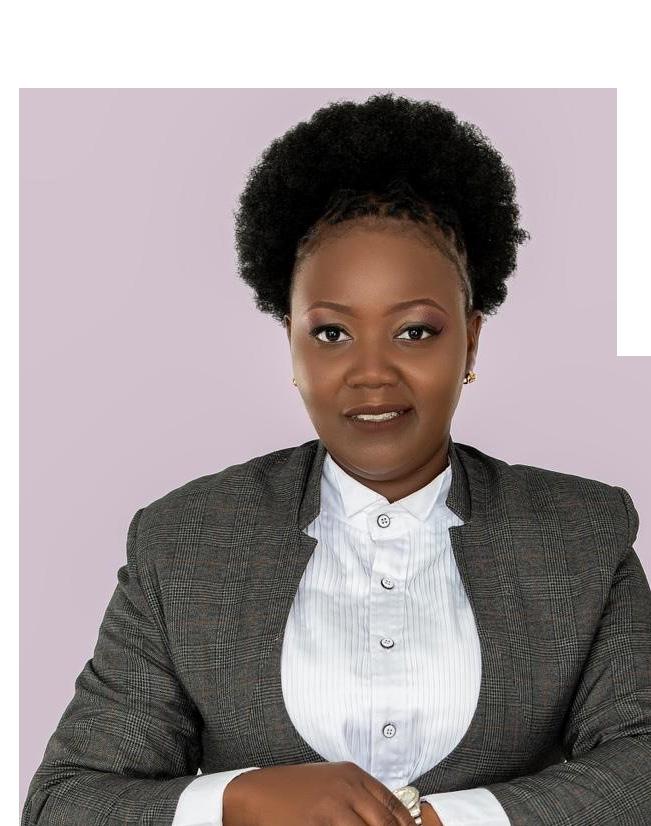
The intervention on leadership programmes also focused on SGBV, which is a major deterrent to women participation in politics, either as candidates or voters. In recent times, this violence has shifted online, in what has come to be known as technologically facilitated genderbased violence (TFGBV).
“What many people don’t realise is that women in leadership are often targeted not just politically, but personally,”
Leticia Mwavishi, the organisation’s programme officer for Sexual and Reproductive Health and Rights explains. “The violence isn’t just physical any more: it’s digital, systemic, and often invisible. They’re harassed, shamed online, and isolated. We had to shift that narrative.”
Getting women ready for leadership
In response to these challenges that women face when seeking leadership positions, FIDA-Kenya launched the Women Leadership Academy in 2021. The objective of the academy was to identify, nurture, and profile aspiring women leaders across the country.
In addition to these, FIDA-Kenya conducted the Vote a Dada campaign, university dialogues on the two-thirds gender rule, all meant to build momentum towards the election of women in political positions.
Anyango explains. “We wanted communities to see women not as exceptions in politics, but as essential to it.”
Those who benefited from these trainings included members of the Kenya Women Parliamentary Association (KEWOPA), the Kenya Women Senators Association (KEWOSA), and County Assembly women caucuses.
As FIDA-Kenya conducted these trainings, it was also pursuing another strategy to get more women into leadership position: working with male champions, community-based organisations, and women’s rights organisations to “reshape the conversation on patriarchy,” and push for a more inclusive political environment at every level of governance.
This inclusivity involved ensuring women with disabilities participated in the political arena, not as observers, but as contenders.
“Many of these women had passion and vision but lacked a platform. We offered capacity strengthening, mentorship, and the legal awareness they needed to vie for political office,” notes Elizabeth Gichohi, the programme officer at FIDA-Kenya.
“There’s still so much misinformation about the capacity of women with disabilities. Our role was to amplify their voices, not speak for them, and to ensure they were in every room where decisions are made.”
Leticia Mwavishi, Program Officer, Sexual & Reproductive Health & Rights - FIDA-Kenya
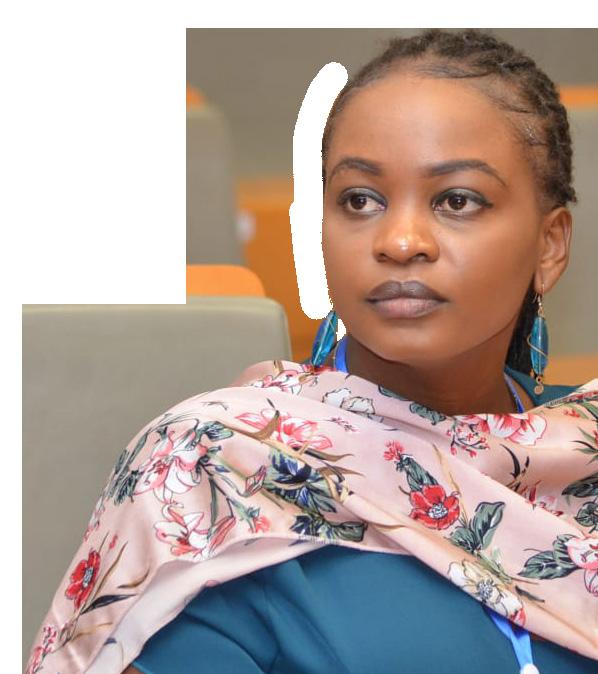
Pushing for transformative legal regime
The organisation bolstered these efforts by pushing for a legal regime that protected and advanced justice for women experiencing SGBV both offline and online, including during political contests.
It is this push that in 2022 contributed to the establishment of Kenya’s first-ever SGBV Court in Shanzu, a specialized judicial forum to hear and determine sexual and gender-based violence cases swiftly and sensitively. Since then, 14 more SGBV courts have been established across the country.
“That’s a monumental shift in how justice is delivered for survivors of SGBV,” Anyango observes. “These courts aren’t just legal structures; they’re sanctuaries for healing and accountability.”
To further strengthen the protection, safety and the rights of women in relation to SGBV, FIDAKenya implemented the #SafeAtWork campaign, aimed at strengthening the women’s movement, particularly for women with disabilities.
A critical focus of the campaign was the inclusion of women with disabilities, who face compounded discrimination that often leaves them voiceless in political and public discourse.
“The heartbeat of this project was simple,” says Gichohi. “Create space. Build capacity. Break barriers. And do it by centering women and community allies at every stage.”
Under this campaign, the organisation trained 20 women caucus members from Machakos County Assembly on the International Labour Organisation’s Convention 190 (ILO C190), which addresses violence and harassment in the workplace. FIDA-Kenya later submitted a joint memorandum to the Advisor’s Office of Women Affairs, pushing for the convention’s national adoption.
Influencing national processes
At the national level, the AWESOME project has helped FIDA-Kenya to gain enhanced recognition of the work it does. “Today, we sit on three influential national task forces,” Gichohi reveals. These include the National Council on the Administration of Justice on GBV, the National Taskforce on Femicide, and the Taskforce on Police Reforms.
These engagements have resulted in the formulation of a draft Sexual Offences Bill (amendment), which promises faster access to justice for survivors of SGBV. Additionally, the Femicide Taskforce is recommending a specific law to address the rising cases of femicide in Kenya. “These are not just legal wins,” she adds. “They’re life-saving reforms.”
But these successes have not been without challenges. Disruptions caused by national protests created logistical hurdles, and tight budget lines strained implementation.
“One thing we would do differently? A more flexible budget. That would allow us to pivot more quickly and respond to emerging needs without losing momentum,” Anyango reflects.
She also emphasises the importance of psychosocial support for women leaders, especially those who lose elections or face harassment. This assistance is always lacking. Offering care, even after campaigns end, is critical to sustaining women’s participation,” she says.
This was no ordinary project. It was, in Anyango’s words, “an AWESOME campaign indeed.” It has rewritten the script for women’s leadership in Kenya, built new legal infrastructure for SGBV survivors, and planted the seeds of a vibrant, interconnected movement across the country and beyond.
Change is real
Gichohi remains hopeful. “Change is not coming. Change is here. It’s in the women organising in Kakamega, in the girl learning her rights in Mandera, in the male ally in Kisumu who speaks out against violence. It’s in the WROs that refuse to be invisible,” she says with conviction.
What’s clear from the project is that the path to gender equality in Kenya and beyond is built on collaboration and continuity. Leticia is emphatic about the role of unrestricted funding for WROs, enabling them to align vision with action, and meet women’s needs without bureaucratic red tape.
“We’ve proven that changing narratives is possible,” Leticia concludes. “But what we need now is continuity of funding, of partnerships, of voices. That’s how we secure a future where every woman and girl can lead without fear, and live with dignity.”
“Change is not coming. Change is here. It’s in the women organising in Kakamega, in the girl learning her rights in Mandera, in the male ally in Kisumu who speaks out against violence. It’s in the WROs that refuse to be invisible.”
Elizabeth Gichohi, Programme Officer at FIDA-Kenya
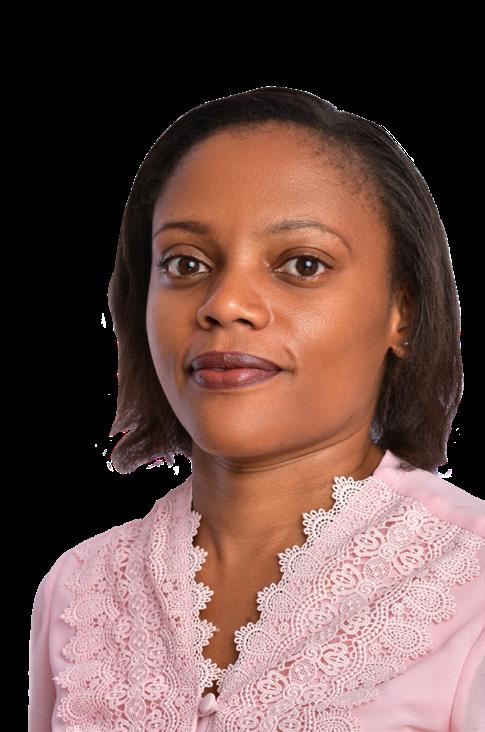
AWESOME COFFEE BOOK // KENYA
Making Kenyan communities safer and free from sexual and gender-based violence
From a timid woman to a leader advocating for women’s rights
Esther Onana is a business lady and a farmer when she is not doing community work in her home area in Migori County, Kenya.
For many years, she has been bothered by the many cases of sexual and gender-based violence (SGBV) perpetrated against women with disabilities. These women have suffered in silence, nursing pain only known too well to them.
But in 2015, Esther together with other women with disabilities joined hands to try and address SGBV that was widespread in Migori. It is while responding to this challenge when they realised that there was another monster they had to deal with; especially in Kuria: Female Genital Mutilation (FGM).
These two problems, which were a major violation of women and girls rights, required a structured response. It this realisation that led Onana and other women with disabilities to form a Community Based Organisation to respond to the situation.
They were in the process of strategising on how to respond to these problems when they saw a call to join the AWESOME Programme. Esther applied, and they became part of FIDA-Kenya team that was responding to SGBV challenges facing women in Kenya.
As a person with disability, Esther says, she comes across many needy cases of SGBV of girls with disabilities in her area, Migori, and neighbouring regions, Kuria and Suna East and West. She says the knowledge she gained under the AWESOME project has been transformative.
“We were trained on how to do referrals, how to do sensitisation and how to advocate for ourselves. With this, we found the courage because many of the cases that we were identifying were ending up in kangaroo courts, defeating the search for justice for survivor of this form of violence.
The so-called kangaroo courts are presided over by clan elders who listen and mete out “punishment” on the wrongdoer. These informal tribunals are chaired by men, and decisions made follow the traditional customs and cultures. In most cases, they are very lenient with the perpetrator.
“We established that a lot of violations were done to
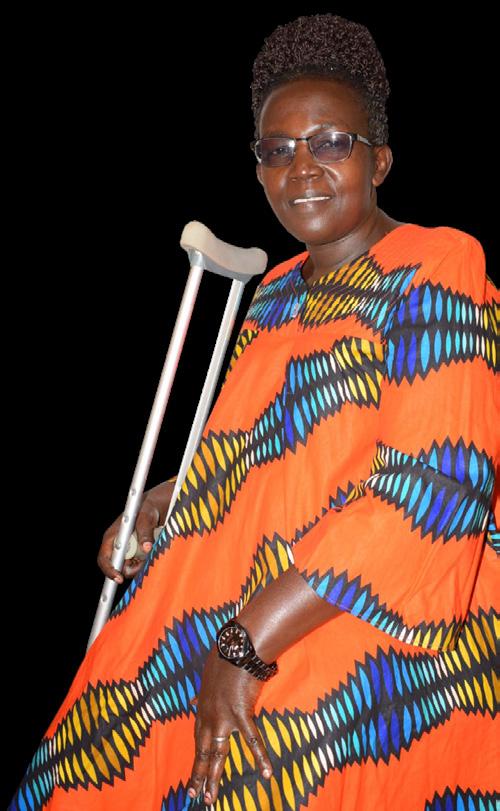
women when cases went to kangaroo courts. There was never justice,” Esther explains.
When FIDA-Kenya trained Esther under the AWESOME programme, she learnt about the referral pathways: First reporting to the police, preserving evidence, and going to hospital for medical examination and the subsequent formal reporting and processing of the perpetrator to go to court.
“While this process is happening, the perpetrator would be in custody (before being taken to court). Initially, preparators would continue with their lives with no consequences as kangaroo courts deliberated,” explains Esther.
She is happy this intervention and the advocacy is paying off. She beams, “Since the start of this project, about four years ago, three perpetrators are serving prison sentences because of sexual gender-based violence in Migori County.”
Additionally, the financial support from AWESOME enabled Esther’s CBO to penetrate deeper in community to address SGBV cases and empower women and girls on how to seek justice.
“We were able to spread our wings in Kuria area, and in 2022, we joined hands with other CSO’s in the area to rescue five girls with disabilities who had been taken in for female genital mutilation,” Esther adds.
She also received training on how to advocate for herself besides being a champion on general human rights issues. These trainings have emboldened her.
“FIDA-Kenya and the AWESOME programme has built our confidence. I’m now able to speak freely in barazas on issues of sexual rights and human rights in general,” she adds, beaming.
Esther is grateful for the benefit of courage and being able to speak up through the trainings and legal clinics hosted by FIDA-Kenya.
She helped a widow fight for land she was on the verge of losing and the threat of imminent eviction on account of cultural customs.
The participation in the AWESOME Programme had another effect on her- Leadership ambitions. Esther contested in the 2022 elections for the Member of the County Assembly seat. She attributes her success in the political space to the programme.
“It was through trainings by FIDA-Kenya that I learnt about tactics to win an election besides building confidence. They also connected me to radio talk shows where I was able to sell my agenda. I learnt that leadership does not only mean serving in political positions, but it’s also lobbying and presenting yourself for other roles such as the County Executive positions. I lost the seat by only four votes. For me, I still won because I was contesting against 12 men.”
Confronting challenges
Even with these immense successes, Esther had to content with several challenges. One of them is the secret kangaroo courts that are still in operation. “There are families who would rather take their cases there because of cultural and societal issues. Cases of GBV and sexual abuse still attract shame and it is considered an abomination to talk about.”
This means, she notes, a lot of awareness needs to be done. However, Esther appreciates that the task is easier when people and organisations combine forces. She recognises the vital role male champions play in advocacy for women rights issues.
Moving forward
Esther plans to continue with her advocacy work as much as she can. At 50, she feels her life purpose has just begun.
Women with disabilities, however, are uniquely challenged. The system is already flawed for women and even tougher for those who live with disabilities. “People see disability first, then human [being] later,” points out Esther, who plans to vie for office again in the 2027 elections.
As a parting shot, she says,
“I want to appreciate the AWESOME programme as I have 15 girls with disabilities and 25 women who can confidently speak up and fight for their rights.”
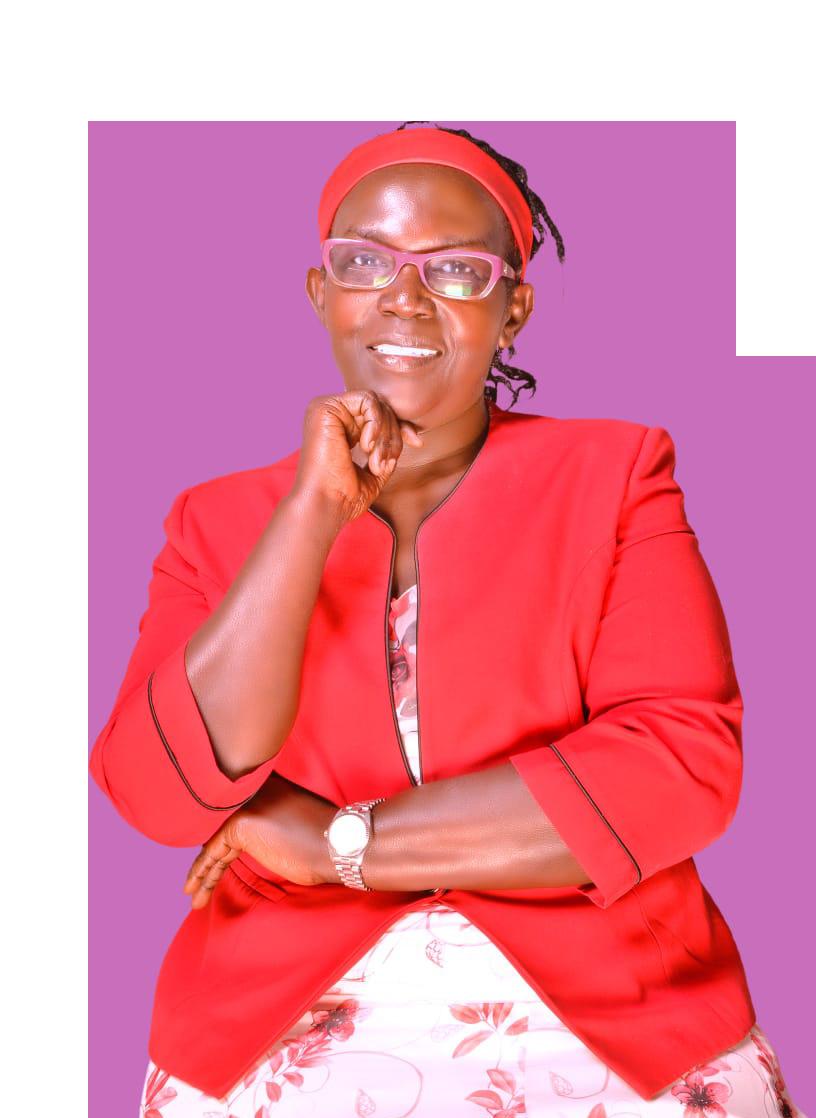
AWESOME COFFEE BOOK // KENYA
Male champion finds life’s meaning in promoting women’s rights

John Kinuthia wears many hats. He’s a trained paralegal, a children’s protection volunteer, and the deputy chairman of Naivasha’s District Peace Committee. Community members know him as a man with immense passion to address the many ills affecting his community, especially issues related to conflict and violence.
But his detest of sexual and gender-based violence (SGBV), and efforts to help women and girls live a life free from violence, faced
difficulties due insufficient resources and his limited knowledge of legal matters.
He also lacked proper structures, networks, and recognition to do his work. All this changed, he says, when the AWESOME programme arrived in Naivasha, where he’s based.
“The trainings by FIDA-Kenya under AWESOME were eye-opening. I gained legal knowledge, learned how to document cases better, and how
to build referral systems. Suddenly, I wasn’t just helping, I was leading,” John explains.
The impact of these capacity building sessions and improved knowledge about handling of SGBV was immediate. He was selected to serve as a representative in the Court Users Committee (CUC) and recently spoke on behalf of civil society when Chief Justice of Kenya, Martha Koome visited Nakuru county. That moment, he says, was a milestone not just for him, but for every community voice often drowned out in national conversations.
Beyond capacity building and increased recognition in the community, the programme gave John something else: a renewed sense of purpose and a shift in mindset. “The truth is that many people had a negative perception of FIDAKenya. They believed it only defended women and punished men,” John admits. “But being part of AWESOME showed me FIDA-Kenya’s real mission: justice for all, and equity for the most vulnerable.”
His association with FIDA-Kenya and the AWESOME Programme, started transforming him in a major way. Using the new gained knowledge, John began reshaping how people in his community viewed women’s rights, gender justice, and women rights organisations like FIDA.
“Now, people call me from all over the county to report [SGBV] cases. They know I’ll listen, help, and connect them with justice. That’s the power of trust, and it was built through this programme.”
John’s influence now stretches beyond Naivasha. As a male champion, he supports victims of gender-based violence, connects survivors to psychosocial support and legal aid, and challenges “kangaroo courts” that traditionally silence women.
And it’s not just the community that has benefited, so has John’s own family. “The Ksh 5,000 (USD 39) monthly stipend I receive from the programme might seem small to some, but for me, it made a difference. It helped with bills, logistics and airtime especially in emergencies. It allowed me to show up and do this work consistently.”
Still, the work is far from easy.
John navigates a web of cultural resistance, patriarchal norms, and resource limitations. He’s often the only male champion covering vast areas of Nakuru County. Some community members still view gender work with suspicion, believing it undermines tradition or targets men unfairly.
“But I always go back to the law,” he says. “I remind people of the Constitution; that women have rights, too. That abuse isn’t tradition. That justice is for everyone.”
One valuable aspect of knowledge he has gained under the AWESOME programme is data collection. He has documented a worrying rise in femicide and domestic violence cases. “One of the most heartbreaking things is hearing perpetrators say they didn’t know their actions were illegal. We need more education, especially at the grassroots,” he urges.
To combat these challenges, John has helped to train new gender champions, community members who carry the torch in remote areas he can’t reach. After every kikao (public discussion),
at least one or two individuals step forward, eager to join the cause. “That’s the goal: building a movement. Empowering others to do what I do so that even when I’m not there, someone is speaking up.”
John has also formed a close network through WhatsApp groups of male champions, where they share resources, opportunities, and mentorship. And thanks to FIDA-Kenya’s media partnerships, John has featured on radio and TV, reaching audiences far beyond Nakuru. “The media exposure brought in cases from all over. It increased awareness and made people feel they weren’t alone.”
John stresses, “The media has been very instrumental in GBV work and I can proudly state that we’ve had cases receive justice immediately they are aired.” https://www.youtube.com/ watch?v=1KwqeidCzJE)
For John, this journey is not just professional it’s profoundly personal.
John is now not only being invited to schools and communities to speak against GBV but also churches. He is proof that men can be powerful allies in the fight against gender-based violence not as saviours, but as partners. That cultural change begins with conversation.
“This work has become a part of me. I’ll do it even without pay. But with the right support, we can do so much more. Because when women rise, communities rise.”
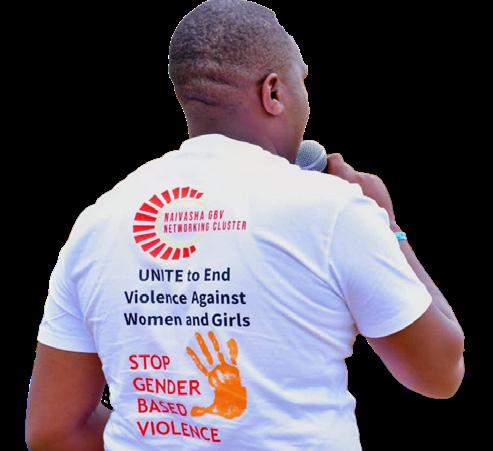
Journeys of Kenyan women into leadership spaces
Dismantling attitudes about women with disabilities: Kiranga’s story
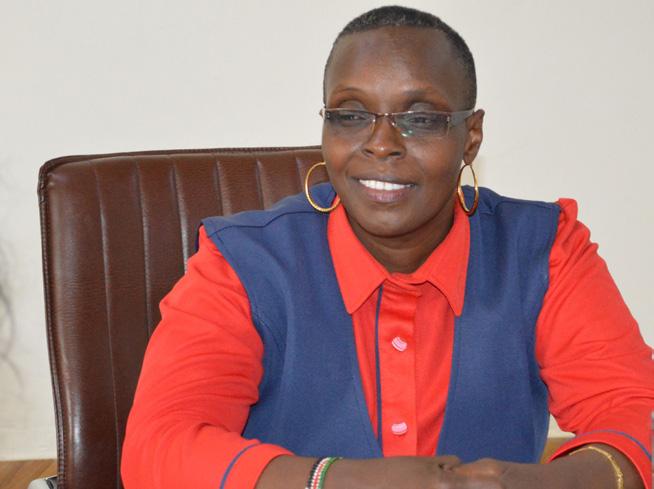
Rahab Kiranga is a force to be reckoned with in the disability movement. She has influenced many changes that have changed the lives of fellow women with disabilities.
Kiranga, who is President of Kiambu County Women with disabilities Network, however says many of what she has achieved within four years would not have been possible without going through a series of training sessions.
It all started when she was enrolled as a rightsholder in the trainings sessions supported by the Advancing Women’s Engagement: Strengthening Opportunities to Mobilise for Equality (AWESOME) Programme, supported by Womankind Worldwide.
Conducted by Women Challenged to Challenge (WCC), AWESOME partner, the trainings focused on propelling women with disabilities to engage meaningfully in decision making processes and tackle sexual and gender-based violence (SGBV).
During the trainings, WCC brought on board key institutions, among them the Independent Electoral and Boundaries Commission (IEBC) and the Office of the Registrar of Political Parties (ORPP) to educate the women with disabilities on their political rights and election rules.
Kiranga insists that these sessions not only became a pathway to social empowerment but went one step further, tailoring experience to fit the needs of women with disabilities.
County Women with disabilities Network, which has been able to recruit 1,200 women with disabilities.”
As a network, they have been able to push for their inclusion in law making processes at the county level. “We drafted the Kiambu County Persons with Disability Bill and pushed for its enactment. We now have an Act in place, assented to by the Governor of Kiambu in August 2022. This law has not only become our guide in lobbying for the interests of women with disabilities, but also in holding our leaders accountable.”
“The programme also connected us with political party officials. Majority of us were able to join political parties, expanding our support networks beyond the trainings.”
Making the big decisions
Within six months of joining the programme, she decided to vie for a Member of County Assembly (MCA) seat in Kiambu County. She did not win, but her life changed completely.
Today, she has become a symbol of unwavering commitment to break barriers for women with disabilities in Kiambu County.
“Before the AWESOME Programme, I never thought I would lead any organisation or steer the formulation of laws at the county level. The trainings strengthened my resolve as a woman with disability to push to be at the table, not in the menu.”
“After the trainings, we decided to come together as women with disabilities and form the Kiambu
She says the law is currently being reviewed to align it with the National Disability Act assented to President William Ruto in March, 2025.
Kiranga further says the network has been able to push for the introduction of a dedicated fund for persons with disabilities in the revised county law. “In addition, we have made sure that persons with disabilities will be sitting as a sector during the budget making process once the changes become effective.”
Previously, persons with disabilities were hardly involved in sector hearings at the national and county level. “But now, we will be sitting as a sector to identify and prioritize our needs. We will then be required to defend our budget in the County Assembly.”
She is very proud of this new development, which has given them a greater say in how the county resources are allocated and utilized.
“Now we are the implementers. The work of the County Executive Member (CEC) in charge Gender Culture Social Services is to oversight but the rest is up to us. So, I am very proud of that.”
Dispersing knowledge and skills
Apart from steering the process to formulate the Kiambu County Persons with Disability Act, Kiranga, has been able to use techniques, skills and abilities she gained from the AWESOME
programme to mobilise women with disabilities and educate them on their rights, their role in decision making processes, and their importance in engaging meaningfully in women movements.
She sits in several committees at the county level. “I am in the leadership advisory committee in the governor’s office. I am also in the National Agriculture Value Chain Development Project and sit in the Gender Technical Working Group on Sexual and Gender Based Violence in Kiambu County. I use my positions to propose names for other persons with disabilities in most committees at ward level.”
In the agricultural value chain, the network has formed the Kiambu Disability Inclusive Avocado Sacco. “The Sacco is one year old and draws membership from both men and women. We have 450 members and our running capital currently stands at Ksh200,000 (about USD 1,500). We grow Hash avocadoes for three months and later sell them to the county government.”
Kiranga’s successes and contribution in the social, economic and political spaces has sparked a shift in how the society perceives and treats women with disabilities.
“The community has realised that we are also leaders and therefore we have been brought on board in many decision-making platforms in the county government. I am contacted for every committee that is being constituted over social disabilities.
Reflecting on her journey, she says that the only thing separating a person with disability from everyone else was opportunity. She says the AWESOME Programme was a great equalizer, breaking down the barriers for women with disabilities.
“I can say I have been able to overcome societal limitations placed on me and create a fulfilling life for myself after the training.”
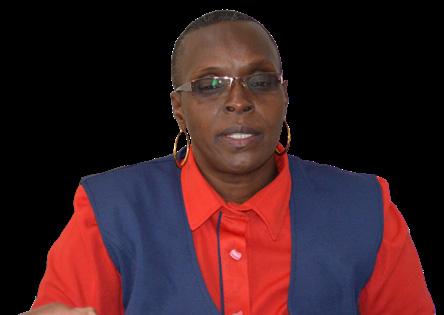
The power of transforming women into change agents
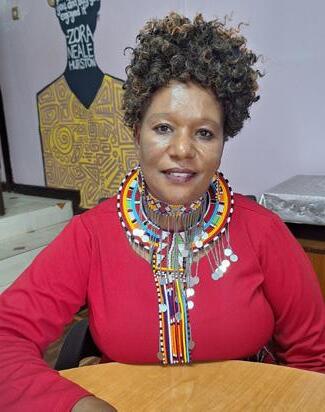
Deep inside Kajiado County, where traditions hold strong and the voices of women have long been hushed or completed silenced by cultural norms, change is coming slowly, one woman at a time.
At the centre of this movement is Caroline Letuya, a soft-spoken yet fiercely determined woman whose journey from self-doubt to selfreliance is admirable.
Like many women in Kajiado, Caroline lived in a world where gender inequality was normalised, and leadership was seen as a male preserve.
With a certificate in Early Childhood Development and Education in hand, Caroline was working informally and volunteering in community advocacy when she first encountered AWESOME through the Federation of Women Lawyers in Kenya (FIDA-Kenya).
“I used to be so unsure of myself. I didn’t know what I wanted in life. I had nothing and no one to look up to. But the AWESOME programme changed everything.”
Through the Programme, Caroline was introduced to an all-rounded model of empowerment, one that did not just focus on skills, but on shifting mindsets. The programme exposed her to life skills training, leadership coaching, economic empowerment, legal literacy, and gender rights education.
“The sessions were eye-opening. I learned about setting goals, managing resources, asserting my rights, and the importance of self-confidence. It was like finally being seen and heard,” Caroline says.
One of the most impactful parts of the programme was its focus on self-awareness and feminist leadership. Caroline learned how to identify harmful stereotypes, speak out against injustice, and mobilise other women to challenge societal norms.
“For the first time, I realised that leadership wasn’t just for politicians or wealthy people. It was for anyone with a voice and a dream, including me. Also, previously, I knew little about the real meaning of the rights of women and girls in life. I learnt in the programme that women and girls’ rights are a broad definition,” she says.
The programme triggered in Caroline several changes, among them the ability to learn, feel, and understand what her strengths are and how to use them in everyday life.
Ripple effect of her change
Caroline’s uplifting did not end with her. The knowledge and confidence she gained began to spill into her family and beyond. Her growth saw her contribute financially to the family, she became a better planner, and started leading by example in mentoring young women and girls in her community.
“I started posting on social media, urging others to participate in empowerment programmes, and discussing issues like self-reliance and dignity in small community groups,” she says.
She even helped to form a support group for women, offering a safe space for them to share business ideas, engage in table banking - an informal communal savings and loan scheme - and support one another emotionally and economically.
“It has been beneficial also because of the support system and the networks that I have created as a result of taking part in the programme, which have contributed to my personal and professional development,”
This growing community of informed women, many of whom were inspired by Caroline’s journey, is strengthening the women’s movement in Kajiado and challenging the harmful cultural narratives that have sidelined them for generations.
Still, the work has not been easy. Caroline speaks candidly about the challenges she has encountered, particularly within her Maasai community.
“Some deep-rooted cultural norms discourage women and girls from speaking out. When I advocate for equal rights, I’m sometimes seen as disrespectful or as someone trying to go against tradition,” she says.
Other hurdles include limited resources, lack of male support, fear of backlash, and low awareness among target women.
But the strategies she learnt under AWESOME helped her to overcome some of these challenges. These included building alliances with the police, chiefs, the media, and organisations like FIDAKenya to advance her cause.
“Despite the discouragement and fear, I reminded myself why I started this journey. I stayed focused and committed to creating a safer, fairer space for women and girls,” she explains.
Building a grassroots movement
Beyond awareness-raising, Caroline has made deliberate efforts to strengthen the women’s movement. From small group discussions on property rights and leadership to guiding women on where to seek help for sexual and gender-based violence, she has become a bridge between knowledge and action.
She believes that this impact can and must be replicated. “Women like me can become mentors. We need to share our stories and lessons with others,” she says.
“We should establish forums where women can regularly meet, learn, and support each other. These spaces build confidence and collective strength.”
As she reflects on her journey and the end of the programme, Caroline feels that significant change has been felt in her community yet much more needs to be done. “So many women and girls haven’t been reached yet. We’ve seen what this programme can do. We need more training, more support groups, more awareness,” she pleads.
Moving forward, Caroline is advocating for continued community education to address stereotypes, stronger partnerships with local authorities, including chiefs, Members of the County Assembly and the police. She also feels stronger women networks and financial support for grassroots women’s organisations will enhance solidarity and action towards promoting women rights.
All said and done, Caroline is now a leader, an advocate, a community organiser, and most importantly a symbol of what’s possible when women are given the space, support, and tools to rise.
Training stirs up Halima to push for the rights of women with disabilities
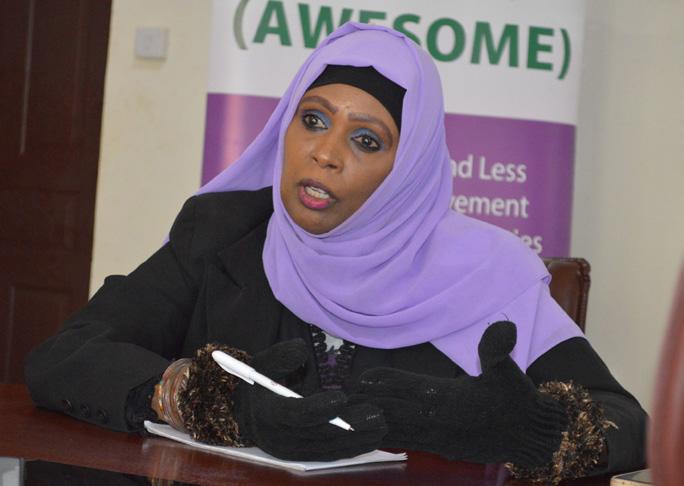
Halima Shariff does not shy away when it comes to pushing for inclusion of women with disabilities in leadership positions, fighting against stigmatisation, or bringing to light the challenges they face in accessing basic services like education and health.
Before she met Women Challenged to Challenge (WCC), Halima was a reserved persons not knowing how best to fight for her rights. This personality started to change when
WCC took her through a series of trainings under the Advancing Women’s Engagement: Strengthening Opportunities to Mobilise for Equality (AWESOME), a programme supported by Womankind Worldwide.
Halima, who is the founder of Women of Hope Abled Differently (WHAD) in Kajiado County, attracts both admiration and unease in equal measure, thanks to capacity building she got from this programme.
It all started in 2022, when the activist, who grapples with hearing impairment, was one of the rightsholders of trainings done under the AWESOME programme, to equip women with disabilities with political leadership skills. Inspired by what she learnt during these trainings, Halima vied for the Kajiado Woman Representative seat as an independent candidate. She did not win.
“The persons with disabilities, especially women, have had a rough start in life. Most girls with disabilities are not educated because they are stigmatised and have been discriminated against in the family. Under the County Fund, they now have bursaries to realise their dreams of pursuing education.”
“This project equipped me with the knowledge and skills necessary to navigate the political landscape and run campaigns as an independent candidate.”
Being part of the AWESOME Programme, she says, empowered her to make a difference in social world. “After the training, I was also able to revamp my WHAD organisation, which had been dormant because I did not have funding. I realised that I could still do so much to support women with disabilities, majority of whom stayed at home, jobless, relying on friends and relatives.”
Today, Halima sits in the Kenya CSOs Network as the disability chair for policy and legislation. She takes credit for pushing for the adoption of the Kajiado County Disability Mainstreaming Act in 2024 which establishes a Ksh10 million revolving fund.
The fund has enabled women with disabilities to take a step forward in uplifting their selfworth, and become independent members of the society, overcoming the societal barriers that constrained them before.
To enhance the effectiveness of the fund of people with disability, a Board has been established that advises what areas to invest the funds in so that they have great impact on the lives of people with disability. These includes financing their start-up businesses, establishing micro and small enterprises, supports and facilitates training of women with disabilities, mentorship, and the provision of business development services.
Further, the board has powers to use the monies to buy assistive devices for PWDs, support their education programmes; including the grant of bursary to persons with disabilities; and provision of medical services to PWDs, including nutritional services, among others.
Halima’s WHAD organisation is currently mentoring women with disabilities to form and register groups that can attract more funding from the Fund and other sources to boost their ventures.
“Through this mentorship programme, I have seen disabled women able to operate entrepreneurial ventures that have helped them to be self-reliant.”
The activist says she was also able to push for the recognition of gender-based violence in the county law. She is sad that GBV remains high in Kajiado County with cases that involve persons with disability being disregarded.
“We have instances where chiefs and elders still sit to informally resolve defilement cases that involve persons with disabilities which is against the law. The mothers are intimidated and told not to report such cases to the police.”
Another major area she has managed to influence using the knowledge gained under the AWESOME programme is safeguarding the rights of women with disabilities especially in regard to registration procedures. This pushed for the inclusion of registration matters in the county Act.
“If a person has a permanent disability, they do not have to register annually. The Act now stipulates that once you register, you don’t have to register annually.”
Through this registration, the county is able to tell the exact number of people with disabilities, disaggregated on gender basis, and then allocate resources to meet their needs.
These successes are testimony that the AWESOME trainings have changed Halima into a voice of the voiceless, speaking for the disabled

“The AWESOME Programme strengthened us to raise our voice and speak for the voiceless. In our community, women are not allowed to speak in public forums, especially where there are elders. The situation is worse for women with disabilities.
But with the empowerment and capacity building under this project, we feel more confident to be part of decision-making processes both at the county and national level.”
Mutiso’s determination to prove women leadership is a value addition
Life for Victoria Nthenya Phillip Mutiso was one of hesitation, fear, and invisibility. She knew women had no voice and were there to abide with the society’s gender norms and traditions.
As a witness to patriarchal suppression from her childhood to adulthood, she never
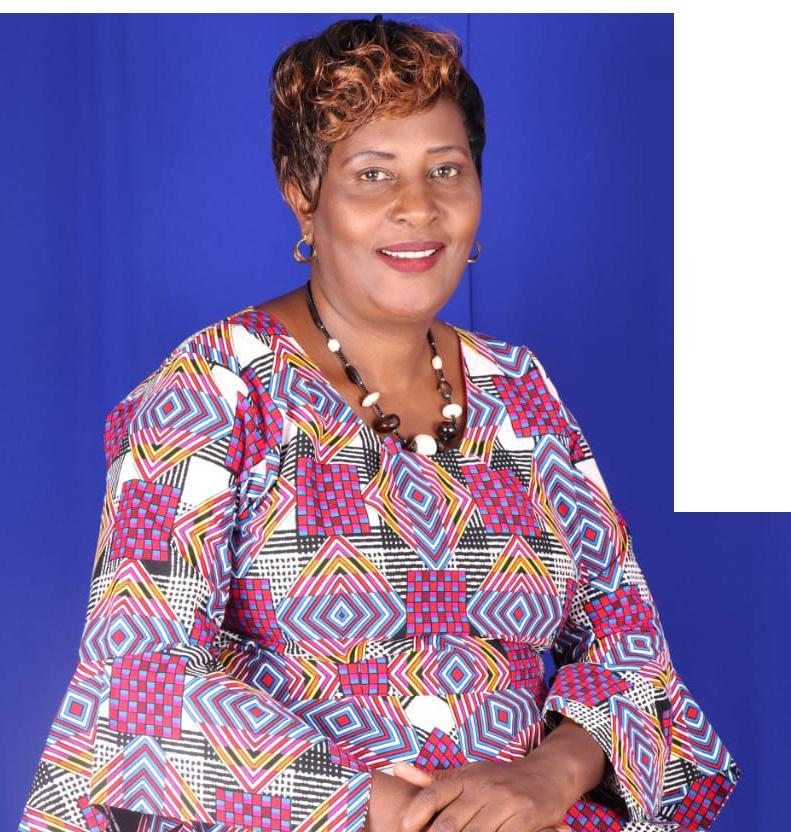
Now over 50 years old, Mutiso walks with the confidence of someone who has claimed her voice and made sure others can claim theirs too: “I used to be afraid to speak out. I feared backlash, I feared stigma. I thought leadership belonged to men or to those already selected by political parties.”
Her keen interest in politics and social justice faced challenges of both the language and the
Things started to change when she went through trainings supported by the AWESOME programme. For her, the trainings were not just an opportunity to gain knowledge; they made her believe in herself, and see impossibilities
“They helped me to unlearn the fear of leadership and understand my
she explains. With this renewed sense of purpose, Mutiso took a bold step in vying for the Member of County Assembly seat in Matungulu West Ward. Though she did not win, the campaign experience empowered her and inspired many other women with disabilities.
Watershed moment
For her family and community, it was a watershed moment. The narrative had shifted from a woman, not seeking a nomination or a handout, but actively pursuing elected leadership.
The trainings also made her a resource in her community. She worked closely with FIDAKenya to train chiefs and assistant chiefs across Machakos County, especially on succession law and GBV referral pathways.
These efforts had tangible success: Chiefs who benefited from the trainings became first responders in land disputes and survivors of gender-based violence knew of safer reporting channels.
“When a chief understands succession law, a widow doesn’t lose her home. When they know how to respond to GBV, survivors don’t suffer in silence,” Mutiso explains.
She’s also an advocate for tech-enabled safety tools, such as SMS-based reporting systems, and calls for real-time gender data dashboards to hold counties accountable. “We’ve seen what works,” she says. “Now we need to scale it up.”
Facing hardships
But her journey hasn’t been without hardship. Her attempts to get in leadership positions faced numerous challenges: Intimidation during her campaign, limited access to funding, and resistance from male elders who discouraged women’s participation in forums. Cultural norms still paint outspoken women as disruptive.
There were also technical struggles when handling sexual and gender-based violence work. Collecting sensitive data on GBV without breaching confidentiality and working in environments without safe houses or trauma counselling for survivors presented major challenges.
Despite the challenges, Victoria is optimistic. She believes certain things need to be done to ensure women enjoy their rights in the social, political, and economic spaces. These actions include: Public financing for women candidates, youth mentorship programs, ethical media reporting on SGBV, and the rollout of specialized GBV courts in every county.
The good news is that her immense work around women leadership and advocacy against SGBV has not gone unnoticed. She was featured in a FIDA-Kenya documentary, a milestone she calls both validating and humbling.
“That film wasn’t about me, it was about every woman who’s ever been told she can’t. It showed that we’re not victims we’re agents of change.”
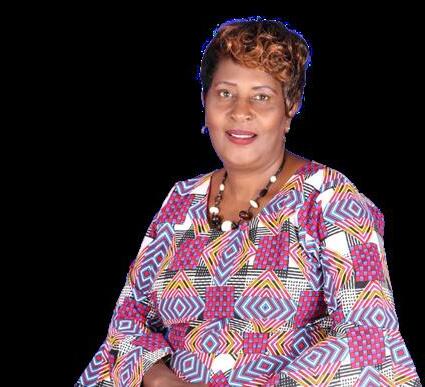
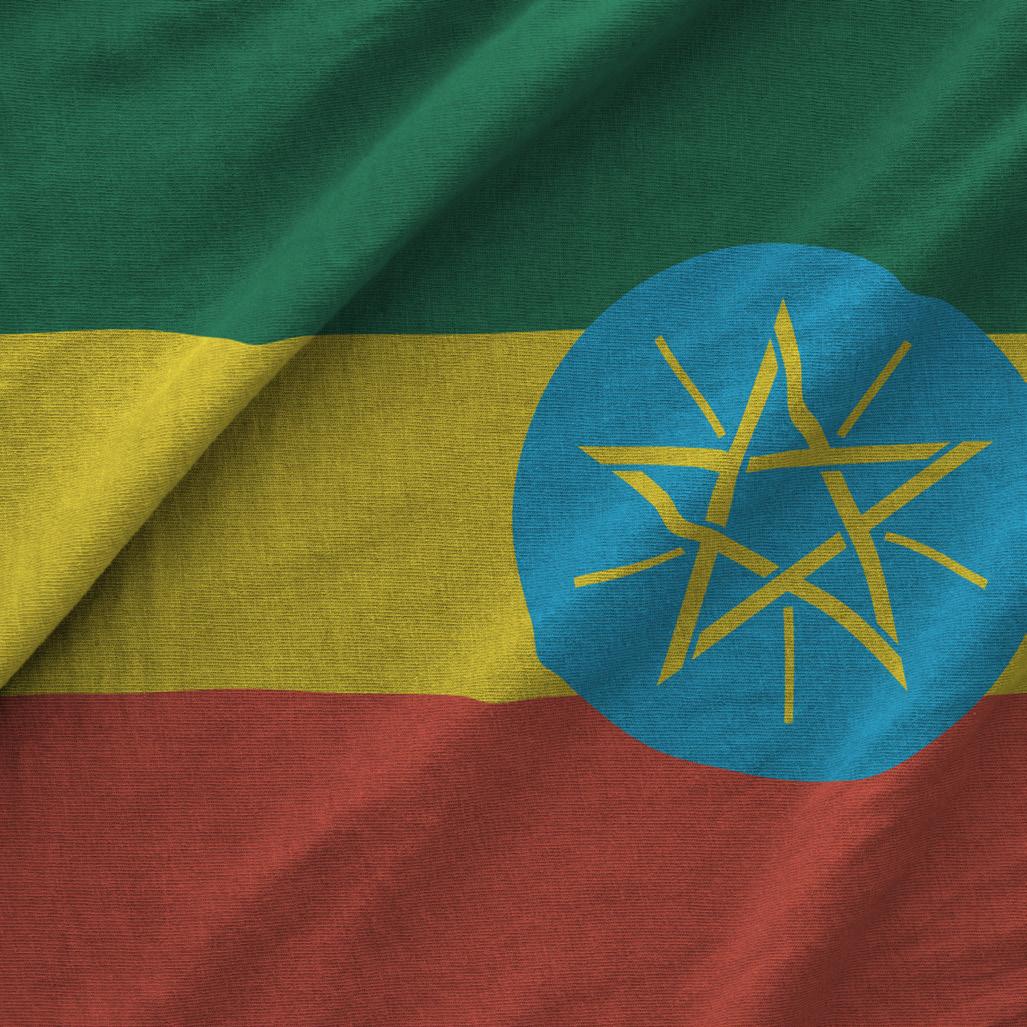
Delivering change in women’s lives in Ethiopia...
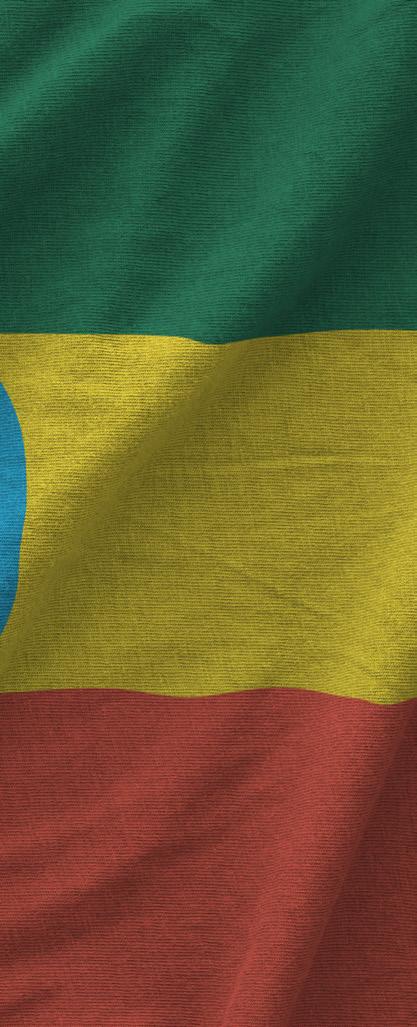
EWDNA pushes disability issue high up on the national agenda
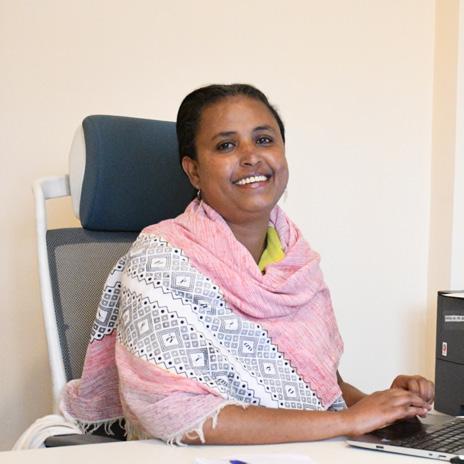
For years, women with disabilities in Ethiopia have had to grapple with stigma, low selfconfidence, and systemic exclusion from mainstream women’s movements. They lacked access to accurate information about sexual and genderbased violence, were unaware of how to report when violated, or even how to secure justice for crimes committed against them.
Fikirte Shumet, Programmes Manager Ethiopian Women with disabilities National Association (EWDNA)
Ethiopia’s criminal code and other legal provisions were not disability-sensitive, either. A GBV survivor with disability, she received no dedicated service because of her disability. She was treated the same way as non-disabled women.
Change seemed distant and out of reach until the Ethiopian Women with disabilities National Association (EWDNA), with support from Womankind Worldwide, knocked on their doors.
The coming of the AWESOME, a programme of Womankind Worldwide, set in motion a series of interventions that brought many women with disabilities into active community life. They assumed leadership positions.
These interventions included capacity building that targeted both duty-bearers and rightsholders. The focus was on comprehensive disability inclusion training for stakeholders such as government institutions, women’s rights organisations (WROs), service providers, and community-based organisations (CBOs).
But more importantly was the capacity-building session for women with disabilities that were designed to enhance their confidence, leadership skills, and understanding of their rights.
These were done to strengthen their ability to participate in community decision-making. The women were also taken through peer-support platforms to foster solidarity and shared learning.
Another strategy EWDNA used to improve the lives of women with disabilities was the #SafeAtWork Campaign, whose objective was to address workplace harassment and discrimination faced by these women.
This was informed by the difficulties the women were facing including unfriendly structures at the work place that made it difficult for them to access facilities such as toilets and meeting halls. EWDNA became a voice for them as many of women with disabilities feared raising these
issues for fear of job losses.
Empowering women with disabilities
But EWDNA knew for sustainability of these interventions, it had to empower the women with disabilities to fight for their rights. These saw the organisation taking them through trainings on how to advocate for their rights as well as their right to protection, support, and legal recourse. Service providers were also trained on how to improve their responsiveness and provision of disability-inclusive GBV services.
To intensify this work, EWDNA worked to strengthen abilities of women’s rights organisations to include issue of disability as part of their advocacy work or programming.
It is this strengthening and collaboration with WROs, government bodies, organisations of persons with disabilities (OPDs), and CBOs that lead to more women with disabilities being embraced by these organisations.
Through this partnership, EWDNA led awarenessraising campaigns to increase the understanding of employers, families, and the community of the rights of Women With Disabilities (WWDs) and the intersectional barriers they face, particularly in relation to sexual and gender-based violence.
It this partnership that was credited for a success story in Jimma where those who had been trained campaigned for access to justice for a deaf GBV survivor who been violated.
Within a month, the perpetrator had been jailed for 14 years, thanks to intense advocacy and the partnership with other organisations. This success can also be attributed to the capacity women with disabilities had gained on how to demand for justice and rights for themselves and their colleagues.
“We had equipped women with disabilities with advocacy and communication skills, enabling them to articulate their rights, report violations,
and demand inclusive services from local authorities,” says Fikirte Shumet, the EWDNA Programs Manager.
Using evidence-based methods
“But for us to be convincing,” Shumet adds, “we used evidence-based methods. We carried out assessments to identify gaps in service delivery and legal frameworks, including gaps in Ethiopia’s Criminal Code and the GBV response system. We thereafter used the findings to conduct targeted advocacy with relevant authorities and institutions to ensure that GBV services become more disability-inclusive and responsive to the needs of WWDs.”
This data was shared during Dialogue Platforms that brought together women with disabilities, OPDs, women’s rights organisations, and local leaders to discuss pressing issues and agree on joint action points.
“Our policy advocacy was informed by the evidence from our assessments. We engaged with policymakers to highlight systemic gaps in GBV response mechanisms and push for policy reform and implementation of disability-sensitive services. We were also able to push for inclusive planning and budgeting by local government offices,” Shumet
explains.
Engaging the elders
In addition to policy advocacy, the organisation engaged the elders, the custodian of community cultures and traditions, to support women human rights and the rights of women with disabilities. This was one of the most strategic interventions with the elders’ becoming champions of women rights.
“Community elders became important allies in challenging discriminatory norms and supporting the inclusion of WWDs. Their engagement helped to create safer environments and increased acceptance of WWDs in community activities and leadership roles,” says Shumet.
Their participation in community dialogue started to change mindset and open space for women, especially those with disabilities. The communities started to witness a shift in harmful social norms that were hurting women.
Women were involved in decision making and leadership roles. The impact of this campaign was felt when over 570 women with disabilities participated in the National Dialogue process in Ethiopia, an unprecedented level of representation.
During the meeting, their questions and concerns were compiled and formally presented to the National Dialogue Commission, giving voice to disability issues at the highest level. Additionally, women with disabilities began to take up active roles in advocacy, public speaking, and leadership, to push for the actualisation of their demands.
One of the most notable achievements was their inclusion in National Policy Platforms. This created opportunities for learning and outreach that went beyond the narrow confines of the conventional engagements.
Power of funding
EWDNA says the AWESOME Programme helped many of these things to happen to women with disabilities. At the organisation level, the exposure EWDNA got as result of implementing AWESOME programme too opened other doors.
The organisation secured a seat at several national-level platforms that it used to influences the following processes: The National Dialogue process; the formulation of the Disability Act; the drafting of the National Disability Policy; the development of the National GBV Policy; and the elevation of Gender and Disability Intersection to a National Agenda.
Internally, the organisation also grew as result of the programme. Shumet says they experienced a major boost in internal capacity, leadership confidence, and organisational reach.
Because of this growth, they opened five new branches in different regions, expanding its physical footprint and grassroots outreach. It strengthened its membership base and community structures, which deepened its impact at the local level.
EWDNA is now recognised as a critical actor in the women’s movement and a leading voice on the rights of women with disabilities in Ethiopia.
Some of the opportunities they have capitalised on to enhance the results already achieved include using decentralisation and local governance structures. The expanding role of local governments presents an opportunity to mainstream gender and disability inclusion in local planning, budgeting, and service delivery.
Second, Shumet says media and digital tools offer a powerful channel to increase public awareness, combat stigma, and mobilise support. Investing in accessible digital campaigns, storytelling, and social media advocacy can strengthen the visibility and voice of WWDs nationally.
Partnerships with the youth
In using partnerships as a strategy to increase the rights of women with disabilities, EWDNA reached out to youth clubs at Addis Ababa and Hawassa University to speak about disability, and engage students with disability as part of the movement.
These partnerships have helped to address the challenges that hamper the inclusion of people with disability, especially women in decision making and leadership roles. One of this is when people see disability inclusion as a charity intervention and not as the right of PWDs. The most important thing is to present the question as a rights agenda, notes Shumet.
Such perceptions offered useful lessons to EWDNA on matter related to inclusion of women with disabilities. The organisation learnt that gender equality work does not happen automatically. It requires intentional strategies, targeted engagement, and resource allocation.
They also learnt that intensive training for both WWDs and service providers produces transformational results, boosting the confidence of women with disabilities, while improving the responsiveness of duty bearers.
EWDNA further learnt that when women with disabilities are meaningfully represented in national processes, their issues are more likely to be reflected in laws, policies, and services. Representation produces greater policy influence.
Going forward
To secure the rights of women with disabilities EWDNA proposes a number of measures: opening up the civic space and mainstreaming disability rights and needs in all sectors by Government institutions, civil society, and development partners.
This includes adopting inclusive policies, allocating budgets for targeted interventions, and ensuring that women with disabilities are actively involved in planning, implementation, and monitoring processes. There is also need to for legal reforms to expand the rights of women with disabilities and full implementation of the Disability Act, GBV policy, and the national disability policy.
Shumet is happy that a lot has happened to meet these challenges, including uplifting the women with disabilities from their situation and their rights to higher levels compared to their situation before the AWESOME programme.
“This programme has been the most significant intervention ever implemented by EWDNA in terms of addressing our issues as well as increasing our capacity and influence as an association. We all will miss AWESOME!”
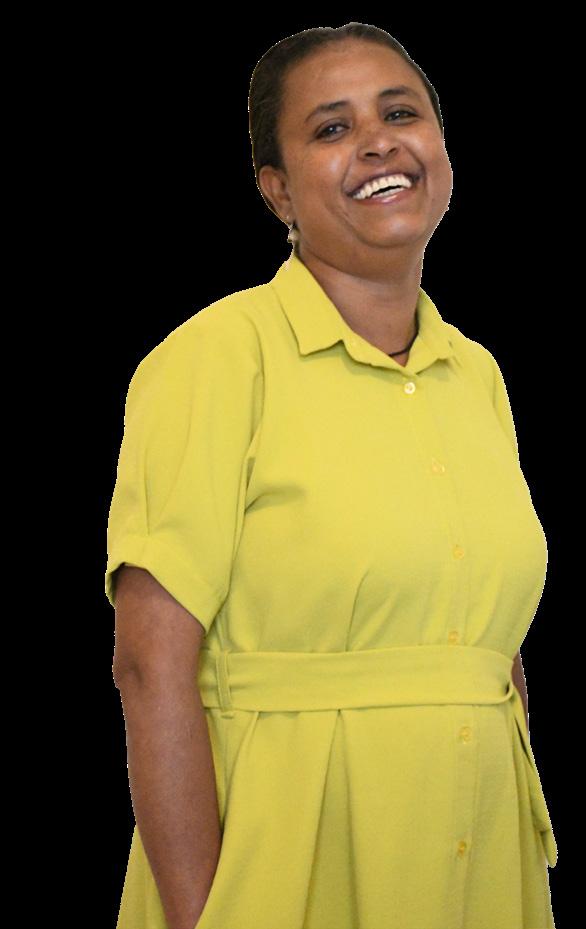
From pain to joy: The story of women workers in Ethiopian factories
They were meant to bring economic progress and happiness in the lives of many women in Oromia region, Ethiopia, but the industries started turning out to be spaces where women were subjected to sexual and gender-based violence.
Instead of aspiring to work in these industries, the women were struggling to find alternatives that were less paying. In effect, they were being locked out from the very economic opportunities designed to turn around the fortunes of their families and communities.
The escalating number of cases of sexual and gender-based violence reported within the industries and their surrounding environments in the region started becoming an issue of great concern. Poor working conditions and the challenging environment denied the majority of workers, who are women, their human basic rights.
Even the national statistics published by the government indicated things were not right.
According to the Ethiopia Health Demographic Survey 2016, young women and girls were said to be vulnerable to sexual and genderbased violence (SGBV) due to their age and low awareness of their rights. The report noted that stigma and fear of discrimination forced most survivors of sexual and gender-based violence
into silence, making it difficult to break the cycle of abuse.
Many of these women were not accessing justice. Economic difficulties, regressive social norms and harmful traditional practices, low educational status of women and men, interference of elders in SGBV cases, and poor law enforcement against perpetrators, were cited as the main causes of SGBV that women and girls were experiencing.
It is in this context that Siiqqee Women’s Development Association (SWDA), with the support of Advancing Women’s Engagement: Strengthening Opportunities to Mobilise for Equality (AWESOME) project, intervened to address the many violations and difficulties the women in the Oroma region were experiencing. These interventions have gradually proved that information is powerful in helping people to make decisions that can help mitigate the challenges they face.
The choice of Oromia was strategic: It is the largest regional state in Ethiopia, with a population of over 40 million people. The region also accounts for a significant portion of the country’s revenue estimated at 45 per cent.
Besides being an agricultural hub, it has also seen massive development of industrial parks, attracting a large labour workforce from various regions, particularly women.
The journey begins
With the support of AWESOME programme, SWDA started to intervene in the factories to address the plight of women and girls.
The objective was to ensure safety and dignity of women and girls facing SGBV within the industries and its environs. Asfaw Kaba, Programme Manager who headed the AWESOME Programme, says the interventions targeted the industrial zone towns of Sabata, Galan, Dukem Bishoftu and Modjo Woredas in Oromia.
The organisation started by conducting a baseline survey to assess the magnitude of the problem in the industries, which then informed interventions that helped it to realise tangible results.
The baseline survey was critical because it affirmed the increase in SGBV in industry settings as well as in the community. The findings were subjected to a stakeholders meeting, who further made recommendations that helped to re-shape some of the interventions that SWDA was undertaking, hence the success of the project.
Kaba notes that some of the key findings and recommendations of the survey included equipping workers with information to advocate for their rights within the industries.
There was need to sensitise factory owners and managers to develop safeguarding policies to prevent and address workplace harassment and gender-based violence. Other critical issues were fair wages and working hours for women in factories and the failure to hold perpetrators accountable for their actions.
“The baseline survey recommended separate gender-friendly and appropriate sanitation facilities such as toilets for women and girls at workplaces. Initially, men and women shared facilities, thus creating health and safety risks and violating basic human dignity,” Kaba explains.
While social norms and gender stereotypes inhibited collective action against SGBV, the survey revealed that some of the communities were not organised to combat the violence, and advocate gender equality. The community also lacked awareness that SGBV was illegal and therefore punishable under the law.
Tackling the problem
To address these challenges, SWDA used several approaches. One of them was conducting a series of capacity building sessions for various stakeholders to create awareness on the vice and empower them with information on what to do when violated.
“We began trainings with the women and girls working in different factory sites in Sebeta, Gelan, Dukem, Bishoftu and Mojo to help them to understand their rights and advocate for safe working spaces,” says Kaba.
The women and girls were organised and trained through peer-to-peer sessions at their respective sites where they discussed matters that affected their human rights and safety.
There were 12 rounds of discussions at each of the programme sites over a period of three months. Through these interactions, SWDA was able to equip over 4,000 women and girls with information on how safeguard their rights and safety.
In addition, over 50 paralegals drawn from the women workers were trained on legal provisions that address gender-based violence, specifically Ethiopian criminal law. This was powerful because these women were in turn able to educate their communities as informed and trusted members of their society.
But training the women alone was not enough. Those who hold power to changing the punitive practices and improving safety and dignity of
women were the factory owners and managers. So SWDA trained dozens factory owners and their management teams of Export Processing Zones (EPZ), on labour laws and the importance of developing safeguarding policies for conductive work environments to combat sexual and gender-based violence in workplaces.
The engagements included working with the factory managers to assess reporting mechanisms and develop internal policies to safeguard the rights of workers.
And to form a strong coalition of women rights advocates, SWDA engaged in other strategies. It strengthened the capacity of over 20 women’s rights organisations on national, regional, and international legislative frameworks for women’s rights, particularly the Protocol to the African Charter on Human and Peoples’ Rights on the Rights of Women in Africa.
Change starts happening
These heightened demands for women’s rights and protection from violations, started to pay off. The workers within the factories formed groups that collectively advocated for safe spaces for women working in factories that were free from sexual and gender-based violence.
The enlightened workers who were now aware of their rights, registered trade unions to enhance their bargaining power, and to push through the realisation of the many rights they wanted the factory owners and managers to implement.
Indeed, these trade unions started to bargain and negotiate for their rights and agitate for safety at work. The trade unions are members of the Confederation of Ethiopian Trade Unions (CETU), an alliance of trade unions.
These efforts, combined with sensitising factory owners and management bore fruit. Over five factory managers put in place measures to that
included how to motivate workers, increase safety of women, prevent SGBV, and established and signed to internal labour union agreements.
“Some factory owners hired gender experts, provided safety equipment and First Aid training, and displayed contact information for safeguarding issues,” says Kaba. “The progress has been slow, but we are witnessing gradual and impressive trend where factories ensuring the safety of women and girls through their policies and structures.”
Some of the factories that have shown great progress on this front are: Prime Meat Factory and One Water PLC Factory, which are SWDA’s AWESOME Programme target rightsholders.
These factories have developed safeguarding polices to stop workplace harassment and gender-based violence, established day care centre for women workers’ children, arranged work shifts to ensure safety of female employees, and offer maternity leave for up to six months from the three months they offered before these changes came into effect.
Male engagement and changing perceptions
At community level, changes were being felt as well. The over 15,000 males, including religious and traditional leaders, who were trained using a model known as ‘community conversations’ for increasing male engagement on preventing SGBV, and promoting women leadership within their target districts, also known as Woredas, started to change male perceptions on SGBV.
SWDA says the religious and traditional leaders up scaled the conversations by challenging gender norms and increased awareness of the social, cultural, economic, and emotional aspects of SGBV in the men’s forum.
“Through this male engagement, the leaders have amended the community rules and regulations to include clauses with stiff penalties for perpetrators of SGBV,” says Kaba.
Community members have taken it upon themselves to ensure that perpetrators of SGBV are brought to book, unlike before when such cases died a natural death. Many cases are now reported to the nearest police stations.
Besides the community leaders, SWDA also engaged various media platforms to amplify issues during international days such as the 16 days of Activism against Gender-based Violence and on International Women’s Day.
“The messages were aired on Oromia Broadcasting Service (OBS) television, Ethiopia’s largest broadcaster, raising awareness of the prevalence and impact of SGBV on women in Ethiopia,” says Kaba.
The rising awareness led to SWDA establishing a GBV investigation team in two project sites with representatives from the government offices for Women and Children Affairs, Social and Labour Law, Police, Attorney, Court, and Health. This team has greatly helped to enhance the effectiveness of GBV response mechanisms by developing guidelines and ensuring adherence to standardised procedures.
Challenges remain
Despite gradual success in the project changing the situation of women working factories, low pay, remains a major issue. This low pay is making many women vulnerable to SGBV and exploitation as male counterparts take advantage of their economic situation to violate or exploit them.
The other challenge is that Ethiopia has not ratified C190 - Violence and Harassment Convention, 2019 which holds authorities accountable on women safety, and protects women and girls working in settings such as EPZ factories from violations.
Lessons Learnt
Despite these challenges, Kaba says this journey has helped SWDA learn useful lessons. The involvement of influential male champions in the journey towards combating SGBV in the region was a game changer for the project.
These champions have played a critical role in helping their male counterparts to understand the importance of respecting women and addressing SGBV; leading to a significant change in male attitudes and behavior towards women and hence a reduction of SGBV cases.
An excited Kaba sums up: “I am pleased that the AWESOME Programme was able to support these interventions, resulting in this remarkable progress in Ethiopia.”
Journeys of Ethiopian women into leadership space...
From despair to hope, the inspiring story of Abebe
Mekremariam Abebe has had a challenging journey as a person living with disability. She was devastated, hopeless, and retreated to a quiet life at home.
“Accepting myself as a person with a disability was very difficult, challenging and depressing,” recalls Abebe of the tough times she had to wither.
Abebe became lonely, with very few people taking time to give her hope. It was during this state of hopelessness when she heard about Ethiopia Women with disabilities National Association (EWDNA).
She visited the organisation for guidance. Fortunately, EWDNA was implementing a programme that was addressing the situation of women like her: the Strengthening Women’s Opportunities to Mobilise for Equality (AWESOME), a programme supported by WomanKind Worldwide.
EWDNA included her into the trainings supported by the programme that were designed to turnaround the lives of women with disabilities.
The trainings focused on peer-to-peer learning sessions that entailed life skills training, coffee discussion sessions, and workshops that addressed inclusion of women with disabilities.
During these meetings, women with disabilities shared their experiences many of which resonated with Abebe’s one. They spoke of hope in life, and that disability was not the end of life, that there were many beautiful and rewarding days ahead. These testimonies started to uplift Abebe’s spirits. Once again, she dreamed of big things in life.
“The AWESOME programme came in as a major relief. I started seeing more women with disabilities speak out strongly about what they were doing to influence decisions in favour of persons with disabilities. How they were making their voices heard on major issues within various decisionmaking platforms. I was inspired,” says Abebe with a reassuring tone.
She saw and heard a lot of passion in her peers who had managed to overcome hurdles that Persons with Disabilities (PWDs) grapple with on a daily basis.
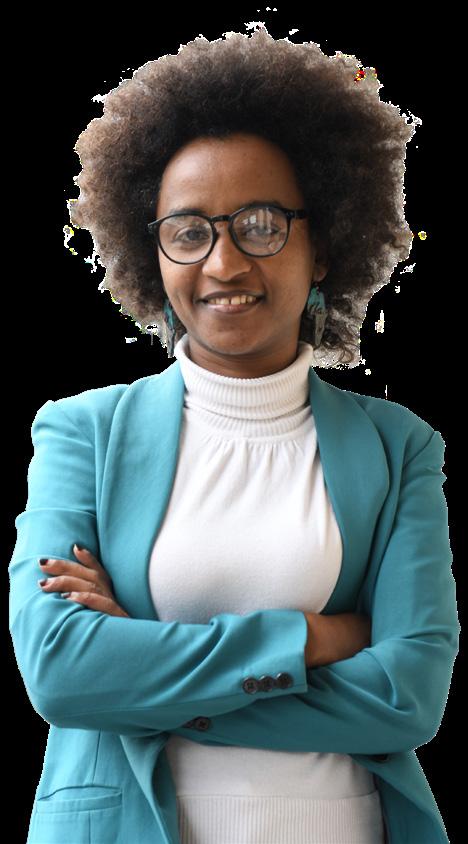
“During the trainings, I saw other people like me who shared in my pain. I found friends and opportunities that helped me to accept myself and decide that life with disability is possible.”
The power of coffee sessions
The coffee sessions were eye-opening and Abebe was able to relive her life experience.
“Every time I attended the coffee sessions, I became more and more confident about my situation and I learnt to accept my new self. I decided to go back to school to pursue my degree.”
So inspirited she was, that after her degree, she secured a job as a teacher in one of the schools in her community. From a person who thought life was hopeless, she was now empowering hundreds of young people with knowledge and giving them hope in life.
Thanks to the AWESOME programme, which she says gave her an opportunity to rediscover herself.
Abebe notes that the many interactions conducted by the programme gave her the courage to forge ahead and overcome the challenges she initially faced. From someone who kept to herself, Abebe is now one of the leading advocates of greater rights for women with disabilities.
“Today, I can proudly say that my disability has not stopped me from doing my work. I have joined other women with disabilities in successfully lobbying for disability rights. In school, I have managed to push for disability-friendly facilities.”
Abebe has also joined other community champions under the AWESOME Programme to inspire women and girls with disabilities to reduce their level of marginalisation. This included challenging inequalities in formal and informal institutions that continue to disempower women with disabilities.
“I can now stand for myself and demand for my rights and others, too. I have made everyone around me think positively about PWDs, learn about disability, and our capacity to lead.”
Her acceptance of who she is and her abilities, has served as a stamp of approval to her leadership skills and earned her admiration in the community. “I am a living example of empowerment. I know my rights and I have strong agency in demanding for inclusion in community processes.”
“Through EWDNA’s coffee sessions, I was able to come out of my comfort zone and take the front seat to tell my story to encourage others.”
Breaking the glass ceiling
True to this, she has broken glass ceilings in organisations that never included PWD in their leadership. During the life of this programme, Abebe earned herself a leadership position in the Iddir Iquib Savings Sacco. This was unique because, previously, PWDs were not invited to join such social institutions. Her inclusion, started having positive effects on other women with disabilities.
“Iddir Iquib is a social institution that everyone in the community joins and makes monthly contributions to, and whenever someone loses a family member, the Iddir will handle the funeral expenses. As leaders, we have been able to table the concerns of young women and girls living with disabilities.”
Abebe has joined other women’s rights organisations where she has been urging the youth with and without disability to stand up for themselves.
“For the two years I have been in this project, my capacity has increased immensely and I have gained confidence to present pertinent issues that concern young women and girls in different forums,” says Abebe.
Her understanding of women’s rights has grown, and she feels the implementation of existing laws to address inequalities that persist in the community will go a long way in addressing the needs and wishes of women with disabilities.
“I use my job as a teacher as an opportunity to influence others to make the plight of women with disabilities part of the women’s rights agenda.”

Aberu’s
win,
a ray of hope for women with disabilities
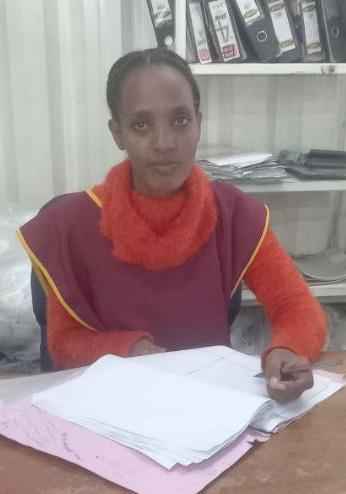
Aberu Tilahun Getachewas’ face beams with satisfaction. After many years of unsuccessfully seeking a job, she looks back and is grateful to be counted among those that are building her nation. No employer wanted to hire her because of her disability.
“I experienced discrimination firsthand, having applied for a job in one of the local factories multiple times for over two years. I was repeatedly denied employment, simply because of my disability,” recalls Aberu.
While on the verge of giving up, one organisation started aggressive campaigns in the factories to include people with disability (PWD), especially women, in their workforce.
This was Siiqqee Women’s Development Association (SWDA), a women’s rights organisation, that reached both women with disabilities and the factory owners and managers to push for the rights of women with disabilities as well as improving the conditions of other women working in these firms.
With funding from the Strengthening Women’s Opportunities to Mobilise for Equality (AWESOME), a programme of Womankind Worldwide, SWDA ran a series of engagements on inclusion of women with disabilities in social, political, and economic spheres of the community.
Aberu, is one of those who benefited from this advocacy landing her a job in one of the textiles factories. During this interview, Aberu was
serving as Production Quality Control Assistant at Alazar Textile Factory, a position she has held since 2024. The company produces various types of garments for both the local and export markets.
Life changing opportunity
The job has significantly transformed her life socially and economically. Her work entails inspecting finished products to ensure they meet the required standards before packaging.
Aberu. “Despite having the qualifications and willingness to work, all PWDs with physical, hearing, and visual impairments were systematically excluded from the labour market.”
She feels this exclusion of PWDs from her community was fuelled by stigma, lack of workplace conveniences, and discriminatory hiring practices by many industries.
This change of attitude and practices were as result of the capacity building session targeting employers and employees in selected factories that were conducted under the AWESOME programme. The trainings educated the employers on inclusive practices and the value their bring to their companies.
SWDA also organised sensitisation meetings with factory managers to open doors for PWDs to access decent work and actively participate in economic life.
“Factory owners were engaged in various trainings, which helped to raise their awareness and commitment to human rights principles, particularly the inclusion of PWDs in the workforce,” says Aberu.
Aberu was lucky to be selected to participate in six rounds of peer-to-peer training sessions that strengthened her capabilities and motivated her to apply for her current job. The training sessions, she notes, helped her to improve her self-esteem and confidence.
Aberu observes.
“I am indebted to the AWESOME programme, which came in time to address the lack of job opportunities for PWDs. We had for a long time been marginalised in the labour market. It has been a life-changing development for many of us,”
The quality control position has also allowed her to demonstrate her capabilities and contribute meaningfully to the production process. She is quick to attribute her success to interventions undertaken by SWDA under the AWESOME programme.
“Before the AWESOME programme, there were virtually no employment opportunities for any categories of PWDs in our community,” recalls
Shortly after completing the training, she applied and was hired by Alazar Textile company.
Aberu’s personal transformation
Realising the impact of vocalising the situation of women with disabilities, Aberu says she has gained a deeper understanding of the rights of PWDs and has become an advocate for disability inclusion, particularly at her workplace:
“I raise awareness among my colleagues and management about the rights and abilities of PWDs, promoting respect, equality, and fair treatment.”
At a personal level, she is grateful for being economically self-reliant, able to feed and clothe herself without depending on her family. This change has brought joy to her family, who are proud to see her thriving economically and socially as an active and respected member of the community.
SWDA is a role model in the community as it has become more aware and supportive of PWDs and now encourages its members to educate and assist PWDs in seeking employment opportunities, especially at local factories within the community.
“Families with children with disabilities are increasingly motivated to send their children to school and have started to overcome the stigma and shame that previously surrounded disability,” says Aberu.
In addition, PWD associations in the community have been inspired to actively engage in various
income generating activities, empowering their members to become more economically independent and socially included.
“This growing shift in attitudes marks a positive change toward building a more inclusive and supportive community for all,” says Aberu.
Challenging times
Despite these successes, PWDs continue to experience myriad challenges that need to be addressed.
“I was lucky to be living near the AWESOME Programme site but many people had to travel [long distances] to attend the peer-to-peer training. This made it difficult for many PWDs to attend regularly.”
Due to the diverse types of impairments among PWDs, providing appropriate technical support was also a challenge. For instance, there was a lack of sign language interpreters for participants with hearing impairments, and supportive devices such as mobility aids or assistive tools were not available.
Some of these challenges continue to marginalise PWDs from achieving their dreams. “People with disabilities have unique skills and perspectives that can contribute positively to society if given the opportunity, “says Aberu.
Miheret Tekola: A formidable force of change
Miheret Tekola is a woman of resilience and strength, whose story is a testament of how empowerment, when well designed, can transform a woman into a formidable force of change.
Before her life changing moment, Tekola was a quiet woman, who was trying find her bearing in life. Excluded from many things in the society due to her disability, Tekola was on the verge of losing hope when things started to shape up for her.
Her journey of positive changes in her life began when she met Ethiopian Women with disabilities National Association (EWDNA), which took her through a series of trainings funded by Advancing Women’s Engagement: Strengthening Opportunities to Mobilise for Equality (AWESOME), a programme of Womankind Worldwide.
“Through the AWESOME Programme, I received trainings that were more than just educational. They were transformational. I gained skills in leadership, public speaking, advocacy, disability rights, and policy engagement. I learned how to communicate confidently with community leaders, how to organise dialogues, and how to mobilise other young women with disabilities.”
Soon after the trainings, Tekola who was a student at Addis Ababa University, embarked on a transformative journey. “I was roped into EWDNA’s work with young women with disabilities via the Yellow, Merawit and Yanche movements based in Hawassa, Mekelle and Addis Ababa.
These movements, she says, created safe spaces for the young women with disabilities to engage on priority issues, build networks, and identify areas of collaboration.
According to Tekola, the young women with disabilities who were part of this process embraced available opportunities with vigor and determination. The results were nothing short of remarkable. Today, Tekola stands tall as a beacon of hope and resilience for young women with disabilities. Through her hard work and dedication, she has been able to push for solutions that address the challenges that face women like her.
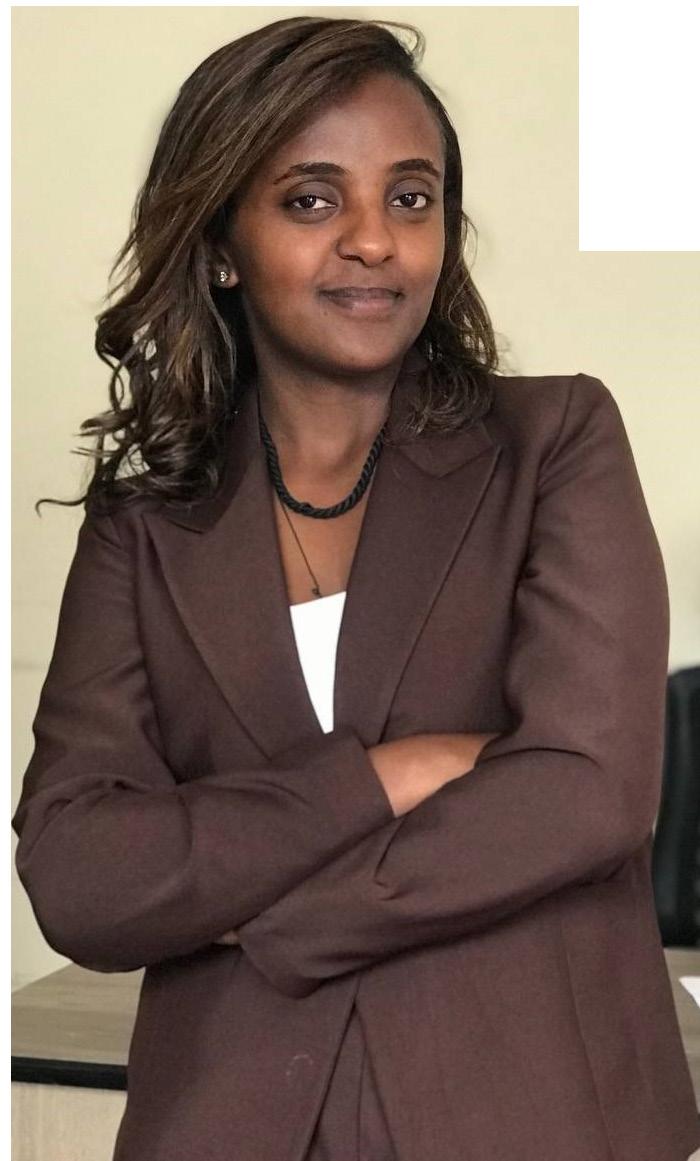
“I have been able to make a raft of recommendations targeting duty bearers and civil society organisations to crease more spaces for our representation.”
No longer bound by the chains of the past, Tekola now proudly says that most young women with disabilities are participating in community events and feel confident to advocate for the rights of PWDs.
“One of the biggest changes in me is my confidence and clarity of purpose. I no longer wait to be invited to speak. I create the space. I no longer hide in the background, I step forward.”
Tekola is now actively involved in advocacy work. “My advocacy work targets traditional leaders, parents, and service providers, urging them to consider including us in everything they do especially around education and Sexual and Reproductive Health Rights (SRHR).”
She represents young women with disabilities in spaces that were previously inaccessible to them. “I speak about our rights, our needs, and the specific barriers we face because policy without our voice is bound to fail.”
“I am observing changes in my own life because I am actively involved in leadership and currently serving as a vice director in a department at a local school.”
This is a position she never, in her wildest dream, thought she would hold. Previously,
she says, people with visual impairment were considered as incapable of leading a division or a department, but this has changed.
“Before joining the AWESOME Programme, I faced challenges that many young women with disabilities silently endure. I lived in a society that saw my disability before seeing my abilities.”
“Opportunities were few, and when they did appear, they rarely included or considered the needs of people like me. I struggled with confidence, isolation, and the lack of platforms where I could express myself or advocate for my rights.
“I often asked myself: Who speaks for a girl like me? Who made sure our needs were included during policy formulation processes.”
The capacity building sessions under the programme marked her turning point. “Today I have been able to champion for these rights. I have been able to bring to light challenges facing young women with disabilities among them discrimination in education, healthcare, and employment.”
With boldness and authority, she has been able to speak out against the challenges that her peers have to grapple with including limited access to SRHR information and services, Gender Based Violence and lack of representation in leadership and decision-making spaces as well as stigma from within their own families and communities.
“What is different now is that we are not silent anymore. We are learning, speaking, organising, and demanding. The AWESOME programme gave me more than training; it gave me a platform and a purpose.”
Tekola, who is proud to be one of the loudest voices on disability issues, says she will continue building networks across disability and women’s movements. “I am also going to continue using storytelling and art in public forums to challenge harmful stereotypes.”
Seeds of Change: The story of Megabit Bekle
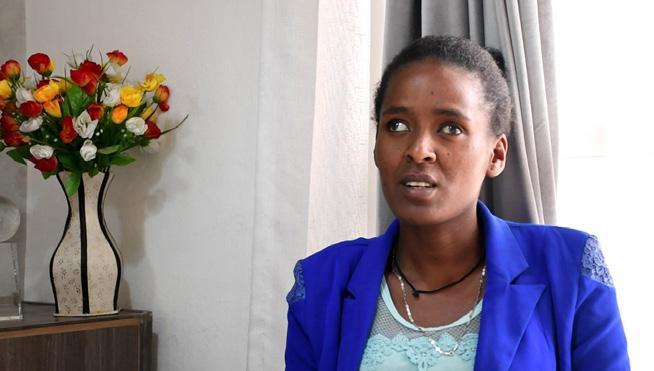
Megabit Bekle exemplifies the transformative impact when capacity enhancement sessions are done in manner that addresses the very needs of women.
Bekle is one of the women who believes the capacity sessions conducted under the AWESOME programme, did exactly that to her.
“When I began participating in the Advancing Women’s Engagement: Strengthening Opportunities to Mobilise for Equality (AWESOME) programme, I gained knowledge and confidence, but I quickly realised that this transformation was also influencing those around me as well. In my family, there has been a noticeable shift in how they view me not just as a woman with a disability, but as a leader and role model.
Their support and pride grew as they saw me actively participate in trainings, leading youth discussions, and advocating for the rights of women with disabilities.”
The life changing project was implemented by Ethiopian Women with disabilities National Association (EWDNA), with the support from WomanKind Worldwide.
Bekle’s knack for social change was enhanced through this programme. She says after going through the training sessions, she is able to influence change, ensure inclusion, and stand up for the rights of women with disabilities at all levels.
In her role at the Bureau of Women and Children Affairs, Bekle uses every opportunity to advocate
for inclusive policies and programs. “I make sure that when we talk about women’s rights, we are also talking about all women; including those with disabilities. I now contribute to planning and discussions with a clear focus on how services and interventions can be made accessible and inclusive.”
She is emphatic that the AWESOME Programme was a life-changing experience which strengthened her leadership skills and allowed her to mentor and inspire others.
“In my opinion, the most enlightening part of the AWESOME programme was gaining the knowledge, confidence, and leadership skills to advocate for myself and others,” Bekle explains.
Before joining the programme, she did not have any platform or the tools to express herself fully. However, through the life skills trainings, she learnt about her rights as a woman with disability, how to speak up, how to assert herself, and how to influence others in a meaningful way.
Today, Bekle who chairs the youth council of EWDNA, says that she is more articulate and assertive about the rights of women with disabilities than before.
With her newfound awareness, Bekle has also made the courageous choice to renounce the societal norms that deny women with disabilities opportunities.
“I have used the skills I gained from the programme to make sure that the needs and voices of women with disabilities are not forgotten in policies and services.”
The programme helped her to look at issues through disability-inclusive lens. “I learned that safeguarding women’s rights is not just about protection from harm, it is about ensuring equal access, voice, and participation in all areas of life, including education, employment, health, and political engagement.”
In addition, she says that significant shifts have occurred in how she integrates issues faced by women with disabilities into her work. “I now have a better understanding that challenges facing women with disabilities differ from those of other women, and I have been able to integrate these issues with greater sensitivity and impact.”
This transformative shift signifies a departure from outdated customs towards a system that upholds the rights and dignity of persons with disabilities.
But this success did not come easy. As a woman with visual impairment, Bekle often faced barriers that not only limited her access to opportunities, but also her ability to speak up for herself and others.
Through the AWESOME programme, she was given not just a seat at the table but a voice, confidence, and the tools to lead.
The series of trainings organised by EWDNA helped to propel her into the public limelight.
“Participating in life skills training and experience-sharing platforms helped me to discover my potential. I learned about my rights, the power of self-advocacy, and how to support other women with disabilities.”
Bekle, who is a member of EWDNA, is currently working with other young people to establish a youth and disability-led association called Duka (meaning footprint). “The main objective is to empower youth with disabilities in Ethiopia to speak about themselves and stand up for their rights.”
Challenging times
Her transformative journey has not been without challenges. Negative attitudes and low expectations from those around her dampen the spirit. “Many people still see disability as a limitation rather than a different way of experiencing the world. At times, I was not taken seriously simply because I am a woman with a disability. People would overlook my ideas or assume that I needed help instead of realising I had something valuable to contribute.”
Lack of accessibility and inclusive spaces, especially in public offices, trainings, and decision-making platforms also present a challenge. “Even when opportunities exist, they are often not designed with the needs of women with disabilities in mind; whether it’s physical access, communication formats, or inclusive language.”
But this has only strengthened her resolve to use her voice, and to turn every barrier into an opportunity to push for change.
“When people doubted me or dismissed my ideas because of my disability, I focused on showing them that I was capable of leading by speaking up, and by staying consistent in my advocacy. “
The skills and confidence she gained through the AWESOME programme has helped her to confront such negative attitudes with strength and clarity.
What next
To ensure the rights of women, especially women with disabilities are sustained, she recommends institutional commitment, continuous capacity building, and meaningful inclusion.
Similar interventions should be replicated to enable more women with disabilities to benefit.
“Future interventions must have tailored life skills training, mentorship, safe spaces for sharing experiences, and meaningful participation in decisionmaking structures.”
Trainings like youth life skills, coffee discussion sessions and advocacy workshops should be considered as they were powerful tools for fostering independence and leadership among women with disabilities, adds Megabit.
“These interventions not only created a support system for us but served as a collective strength that empowered us to take active roles in our respective communities.”
She equips: “The sessions were not just about gaining knowledge; they helped me to discover my inner strength and the value of my voice. I learned practical skills in communication, leadership, advocacy, and rights awareness that I now use in my personal and professional life.
More importantly, I began to see myself not just as a rightsholder, but as a leader and change maker.”
Making workplaces for Ethiopian women free from sexual and gender-based violence...
A voice for women in the Galan community
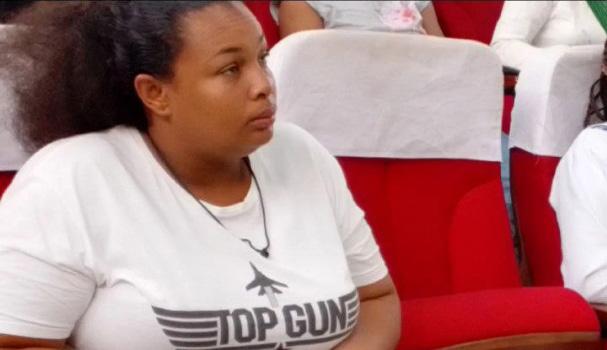
Etefwork Birhanu Gobena never imagined she could become a powerful voice changing the narratives on sexual and gender-based violence (SGBV) in the Galan sub-city administration in Oromia region.
“I did not have the confidence to talk about the rights of women in industries and its surroundings because I thought men knew much more than women,” she says. “I have now learned how to stand up for myself and others, and gained the confidence to speak out.
Her life changing moment happened when Siiqqee Women’s Development Association (SWDA), an women rights organisation enrolled her into the trainings it was conducting under the AWESOME Programmee. She went through
several sessions that helped understand the rights of women, and the skills and tactics to use to lobby institution to guarantee these rights.
The trainings focused on women’s rights, leadership, patriarchal norms, and promoting the fair sharing of domestic responsibilities. In essence, they were breaking the gender norms and cultures that had disempowered women and girls for a long time.
Gobena, one of the hundreds of rightsholders of this AWESOME programme supported training sessions, now plays an active role in sensitising her community on gender equity and the effects of sexual and gender-based violence on the lives of women and girls, and the entire community.
Breaking the silence
Through her courageous advocacy, she has helped to break the silence that once surrounded SGBV in factories and homes across Galan.
Before the advent of the programme, Gobena witnessed how women and girls working in local industries were being sexually harassed and abused, often with no response from the authorities: “Back then, few people took genderbased violence seriously,” she says. “Women suffered in silence.”
Things started to change, she notes, with the implementation of the AWESOME programme in the Galan region. Gobena was lucky to be among those were transformed into advocates to demand for the rights of women in these local industries.
She and her fellow advocates work hand-inhand with local enforcement officers and other women-led movements to ensure justice is served to these survivors
“We speak in public spaces and empower women to report abuse and defend their rights,” she asserts.
Besides being an activist, the knowledge gained helped Gobena to bring change to her family life as well. She started having honest conversations at home about SGBV and gender equality.
“My children now understand their rights. We talk about respect, and about listening to one another. We also talk about self-reporting of any incidents of abuse they may experience or witness,” she adds. “Even my partner now supports equal sharing of responsibilities at home.”
“After going through the various trainings as a representative of community-based organisations (CBOs), I have stood up to boldly demand for the rights of women and girls in these industries and the community,”
Gobena proudly supports survivors of SGBV through coordinated networks with legal and medical institutions. She is excited that through support from the AWESOME programme, OneStop centres have been established to provide holistic care for survivors of SGBV.
As a leader in her community, Gobena uses every opportunity like community meetings, political gatherings, and local events to challenge harmful norms, educate people and encourage men and women alike to speak up.
“We use what we learned from the AWESOME programme to raise awareness and change attitudes. Now, more women are speaking out without fear.”
She asserts that even self-reporting, once considered a taboo, has become the norm, showing a real shift in community attitudes.
Not an easy journey
Despite this progress, Gobena says that being a public advocate for women’s rights has not been easy. She has faced many challenges, a major risk being the safety and security of frontliners like herself.
She has received threats and faced intimidation from abusers who wanted to silence her but she continues to speak out in support of survivors of SGBV. In some cases, she and her colleagues were physically attacked for demanding justice.
“Sometimes we are targeted just for speaking up,” she states. Sadly, government protection has been very limited, often only coming after an incident has already occurred.
One of the devastating incident was the killing of her colleague in 2024 in Bishoftu region. “Her death was heartbreaking,” says Gobena. “She gave her life to this cause. It reminded us that our work is powerful and important, but also dangerous.”
Through her involvement with the AWESOME programme, Gobena has come to appreciate that matters of SGBV are not just about individual cases of abuse. They are rooted in deep, harmful societal norms, gender inequality and poverty.
“SGBV is a symptom of bigger problems,” she explains. “To stop it, we have to challenge the beliefs and systems that allow it to happen in the first place.”
She gives the example of Dukem, one of the project sites, to emphasize the connection between poverty and SGBV.
Economic empowerment is key
With over 180 factories in its industrial park, Dukem attracts thousands of women and girls looking for work. But with limited job opportunities, many remain unemployed, without food or shelter. This makes some vulnerable to sexual exploitation and abuse just to survive.
“The solution is not just to respond but also to prevent SGBV,” adds Gobena.
“We need more programmes that focus on economic empowerment like skills training, access to credit, and support for womenled businesses.”
It is only through strategic support to protect women that the cycle of violence can be broken, says Gobena.
Other measures that Gobena believes need to be put in place to safeguard women rights include strengthening and enforcing existing SGBV laws by ensuring law enforcement and judicial officers are properly trained to handle cases with sensitivity and using a survivor-centred approach.
Thanks to the AWESOME programme, Gobena says she is no longer just a witness to injustice; she is a leader of a movement, a protector of women’s rights, and a beacon of hope in her community.
Violations inspire Mengiste to fight for women and girls’ rights
Gizaw Mengiste is an influential man. As chairman of ‘Fonka Edir’, a traditional social association in Bishoftu District of Oromia region, with a membership of over 1,000 people, he speaks with a beguilingly soft but firm voice. The community is divided into four ‘Fonka Edirs’ (groups), with each one of consisting of 250 members.
Each Edir provides social and financial support to its members, particularly during times of bereavement. Being the overall leader requires firmness and a commitment to ensuring that everyone’s rights are respected and their security is assured.
It is this powerful role that has come to work in favour of women seeking to enjoy their rights and protection from sexual and gender-based violence. Mengiste, who is highly respected in his community, is now a promoter of women’s rights and warrior against SGBV
“A leader must lead from the front by being an example. I first have to showcase how I care for my family before commanding respect from others in the community on matters of handling sexual and gender-based violence,” he explains. It all fits into his vision of wanting to see his community “free from sexual and gender-based violence.”
Previously, women and girls suffered escalating SGBV in silence, but Siiqqee Women’s Development Association (SWDA) intervened to break this silence.
With the support of AWESOME Programme, the organisation used several strategies to get the community to start speaking about women
rights. One of the strategies was to enlist influential members of the community to take leadership on championing of these rights. Mengiste became a crucial ally in safeguarding the rights of women.
Changing attitudes of local leaders
SWDA started by building the capacity of male local leaders, taking them through a series of sessions on how to promote women’s rights and the fight to end sexual and gender-based violence.
Mengiste was among the first rightsholders of these capacity building sessions held with men with the aim of transforming them into champions of women’s rights and advocates against SGBV.
“I benefited from six roundtable flexible sessions on topical issues such as sharing domestic workloads, SGBV, harmful traditional practices (such as FGM, rape, early marriage, polygamy, and abduction), and Sexual and Reproductive Health and Rights,” Mengiste explains.
“After the training, I volunteered to be part of the trainers during subsequent forums and during occasions.”
“Our society is patriarchal and teaches us to believe that men are superior to women. However, today I am an enlightened man and I
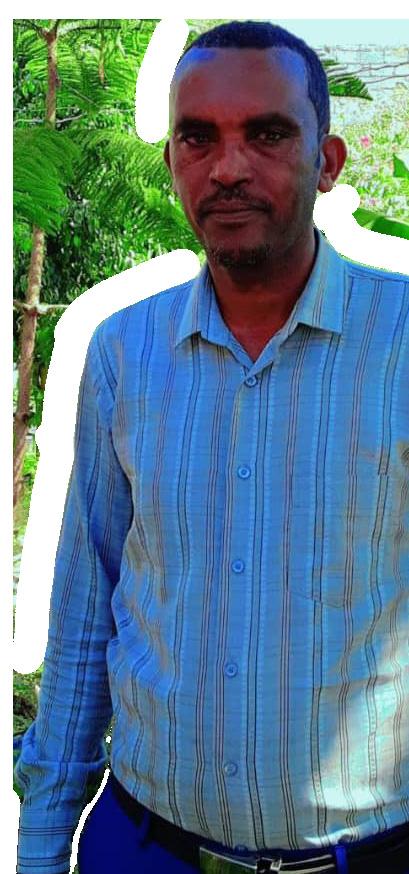
have effectively used my position to champion women’s rights in my community,” he adds.
Mengiste prides himself in being a transformational leader who has worked hard in the community by challenging social norms, and addressing men’s attitudes and perceptions so that they treat women with dignity.
He has been at the forefront of efforts to ensure that perpetrators of sexual and gender-based violence are arrested and face justice, thus serving a social deterrent to this form of violence.
“When informed men like myself amplify the voices of women and girls and advocate for their rights, they are heard and taken seriously,”
he says.
Besides being engaged in community dialogues organised by SWDA, Mengiste also gets platforms to speak to men during meetings organised by various organisations, special occasions such as weddings, funerals, and during annual festivals.
These engagements have borne fruit as many men have begun to understand gender-based violence: “I have received reports from women who previously reported domestic violence incidents that their husbands are treating them better than before,” says Mengiste.
The watershed moment
The watershed moment of this transformation and engagement came when he spearheaded meetings with Fonka Edir officials to draft rules and regulations that were incorporated into their policies on how the community can
respond to sexual and gender-based violence, including traditional harmful practices. Members endorsed the regulations setting out clear terms for punishment for perpetrators and those who fail to report such cases.
Previously, SGBV cases were solved by active participation of “Abba Gada”, a leader of Oromo system of governance, with perpetrators being punished according to the law of the Gada system.
The punishment depended on the crime, and was mostly left to the discretion of the Abba Gada to decide what the perpetrator needed to pay for the crime committed. The punishment could be a fine or take some other form. These new rules and policies spearheaded by Mengiste have changed everything, enhancing justice for women and girls survivors of SGBV.
“Unlike before where cases of perpetrators were handled in the community, they are now taken to the police station and arraigned in court. This has served as an example for many people and hence a reduction in the number of cases,” says Mengiste.
Mengiste notes that although the community is generally aware that SGBV is a major violation under the law, a large proportion of the population from diverse ethnic cultures remains unreached with quality information about these violations and the rights of women and girls.
“We appreciate what the SWDA programme has managed to do. I would propose this programme be expanded to other regions for comprehensive change to happen. The dialogues need to be sustained as changes in attitude are progressive.”
While the community conversations target men, he feels the future of realising women’s rights and protection from SGBV lies in enlisting more local community leaders from the different ethnic groups to help tackle the SGBV vice and promoting women’s rights.
Real change begins with one person
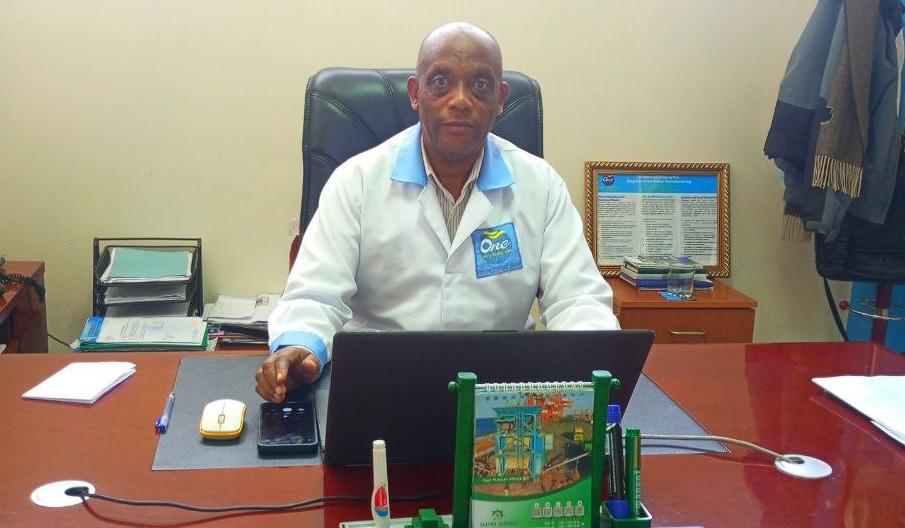
His calm voice belies the authority of Gazahang Zawude, a human resource manager at One Bottling Plc factory in the Oromia region of Ethiopia, wields. To many workers in this factory, he is the saviour they have been looking for to realise their rights.
Zawude has not let them down. He has stood out as one the influential persons championing the rights of workers in this factory. His actions are also having a positive effect to the competitors.
He exudes confidence that his factory will stand out as a model in advancing the rights of workers in implementing policies that protect them, majority of them being women and girls, from sexual harassment and poor working conditions.
Having been equipped with knowledge and skills on gender, labour and human rights dynamics, Zawude has been at the forefront of initiating key changes at One Bottling Plc.
He spearheaded practical improvements that have reshaped the work culture and restored the dignity, privacy and safety of women and men at the workplace.
“We have constructed separate toilets for women and men, unlike before when they were sharing,’” says Zawude. “We have also employed gender focal persons in our factory to handle complaints. Most importantly, we revised our wages and have equal pay for men and women in the same positions.”
His Damascus moment came through his involvement in capacity building sessions conducted by Siqqee Women Development Association (SWDA), with support from the AWESOME prograramme (Advancing Women’s Engagement: Strengthening Women’s Opportunities to Mobilise for Equality), a five-year initiative supported by Womankind Worldwide in Ethiopia, Kenya, and Uganda.
Before the programme, the human resources officer admits that gender issues were often “taken lightly” by factory management. However, through the AWESOME programme intensive workshops and training on topics such as leadership, communication, work ethics, ILO standards, gender equality, and Sexual and Reproductive Health and rights (SRHR), his perspective changed dramatically.
“The programme didn’t just educate me, it transformed the way I view my role as a leader and community member. It also helped me to recognise the gaps in our factory culture and gave me the tools to act on them.”
Safeguarding policy comes into being
Within one year, One Bottling Plc has developed a safeguarding policy for its employees. Zawude was at the forefront of appointing gender focal persons. AWESOME supported him to develop
a policy with clear sexual harassment reporting mechanisms.
“These may seem like small changes,” he explains, “but for the women at our factory, they are deeply uplifting because we now have equal pay for equal work and a fair bonus structure.
This shift had a ripple effect. Zawude observes that there was a powerful spillover into workers’ homes. As women grew more assertive and confident, household dynamics began to shift.
“We have seen improvements in livelihoods as women are now making decisions in their homes, providing for their families and becoming role models in their neighbourhoods.”
He attributes this broader impact to the supportive environment created through AWESOME’s programme, capacity-building efforts including peer-to-peer discussions, mentorship and gender-sensitivity sessions with factory managers.
Resisting change
Change, however, did not come without resistance. Some male colleagues questioned the necessity of focusing on women’s rights, perceiving the shift as a threat. Zawude tackled this challenge with patience and persistence, initiating open dialogues, mentoring sceptical staff, and modelling inclusive leadership.
“I have organised conversations with men and explained to them that gender equality doesn’t take power from them but gives everyone a fair chance to grow,” says Zawude.
His ability to frame issues in a way that is inclusive rather than excluding men helped to ease tensions and gradually built a culture of collective responsibility.
Through AWESOME, Zawude also gained a broader understanding of the systemic issues affecting women, including the impact of social status, education gaps, and limited access to information. This awareness has shaped his approach to community advocacy.
“I now see how legal frameworks, culture, and even unconscious bias shape women’s experiences. I’ve become more intentional in supporting both men and women to recognise and challenge harmful norms,” he asserts.
While his contributions may be indirect, Zawude’s efforts to raise awareness, facilitate learning and promote inclusive dialogues have contributed significantly to strengthening the grassroots advocacy in promoting women’s rights both at the workplace and the surrounding patriarchal community.
Responding to challenges
He acknowledges that advocating for women’s rights in conservative environments brings out its own challenges, cultural norms, economic barriers, and even fear of backlash.
To address these challenges, he says there is need to focus on a multifaceted approach that includes; education and awareness through factory wide trainings, community engagement by involving local stakeholders, challenging harmful stereotypes through open conversations and media and establishing support systems such as gender desks and safe reporting channels to ensure accountability and protection for all employees.
He recommends implementing existing legal frameworks to protect women’s rights, promote their economic empowerment initiatives, and establish support services such as legal aid and shelters.
Zawude further emphasises the importance of advocacy and fostering collaborative partnerships between businesses, civil society, and government institutions, alongside regular monitoring and evaluation to adapt and scale successful strategies for lasting impact.
He dreams of establishing a national network of gender champions across Ethiopia’s industrial zones factories, who have a shared commitment to equity, and where men and women work side by side to challenge gender-based violence and uphold dignity.
His story serves as a powerful reminder that men, especially those in leadership, can be allies and advocates in advancing gender equality.
“Real change doesn’t always begin with a law or a campaign. Sometimes it begins with one person choosing to do the right thing.”
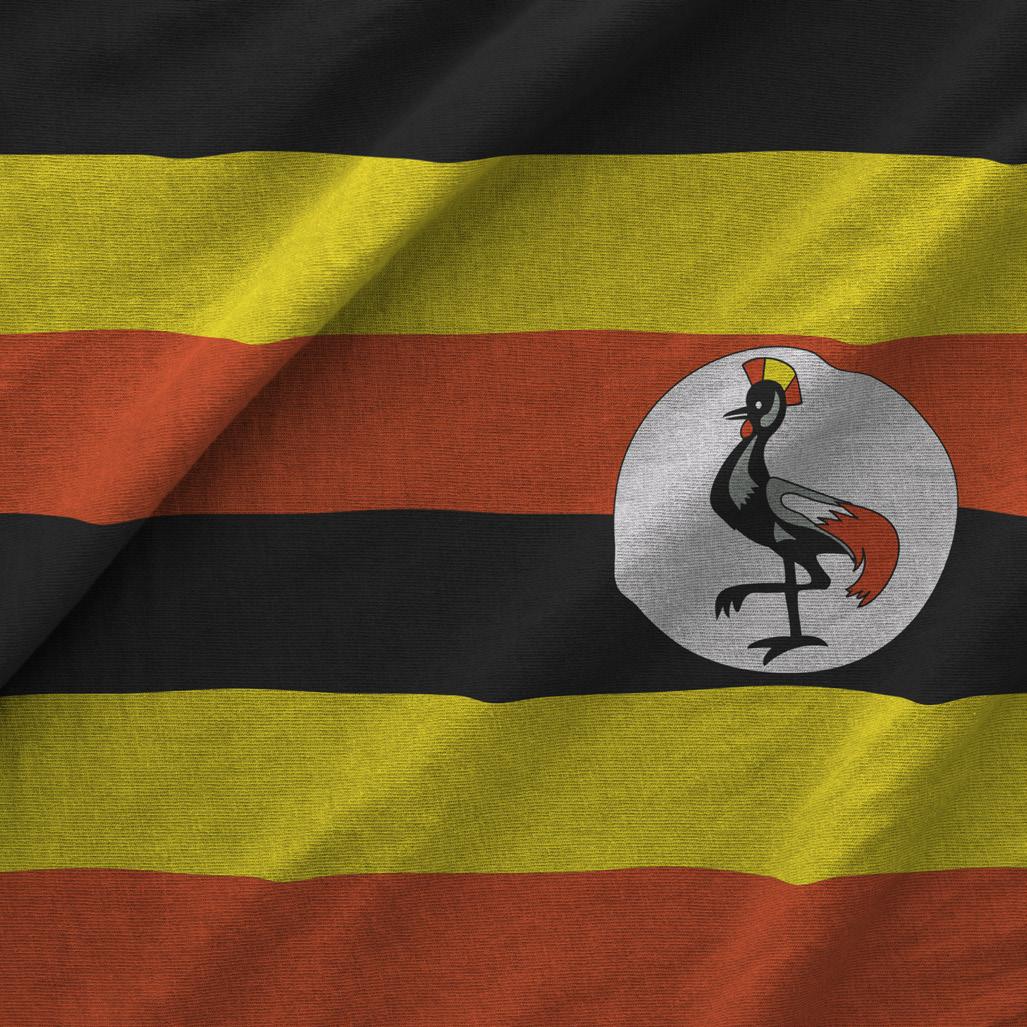
AWESOME programme delivers change in Uganda...

Beyond Promises: Shifting
Power and Cultivating Change for
Uganda’s Women
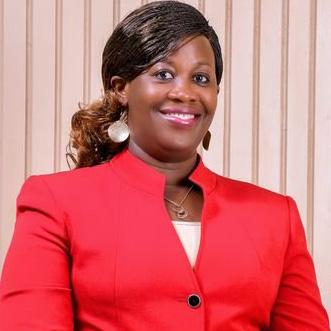
Change is not just coming to the remote corners of Masindi and Lyantonde, in Uganda, it is being cultivated, nurtured, and led by women who have long been kept on the margins.
It is a change millions of Ugandan women have been yearning for many years as they silently grapple with the burden of patriarchy in their private space.
Elizabeth Ampairwe, Director of programmes at Forum for Women in Democracy (FOWODE).
For these women who have been looking for change, help came in around 2021, when Forum for Women in Democracy (FOWODE) with the support of AWESOME programme, intervened.
FOWODE, an unapologetically feminist organisation with a history of turning grassroots voices into national influence, initiated interventions that have touched many lives of Ugandan women.
Over the past five years, FOWODE has used the AWESOME programme not only to uplift women, but to fundamentally shift the systems, narratives, and spaces that have historically excluded them.
“This programme was a continuation of our vision since 1995,” says Elizabeth Ampairwe, the director of programmes at FOWODE.
“We believe democracy must work for women. AWESOME gave us the tools, the platform, and the reach to make that vision real in today’s Uganda.”
Despite constitutional promises and policy frameworks, women in Uganda remain underrepresented, underserved, and systematically disadvantaged. Gender-based violence (GBV) continues to rise, civic spaces are shrinking, and marginalised groups including young women, and women with disabilities (WWDs), are often erased from political and development conversations.
In Masindi and Lyantonde, these challenges are exacerbated by limited resources, entrenched patriarchy, and social stigma.
“Women were struggling to access justice, to lead,
even to speak up,” says Georgia Tumwesigye, the programme manager for the Women and Leadership Programme at FOWODE. “We knew we had to intervene at all levels: self, society, and systems.”
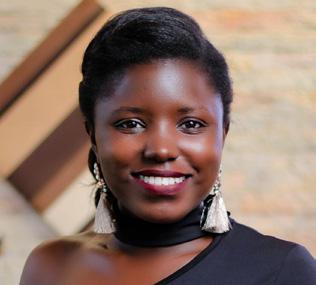
Inspiring results
Under FOWODE’s stewardship, the AWESOME programme has recorded tangible, life-changing results: 24,218 people reached directly through the programme; 175 young women trained in feminist leadership and community action planning; 64 women-led community groups supported to track and demand improved public services; 262 SGBV cases reported, with 71 of them pursued in court and an increase in budget allocations in local government.
These outcomes are not just statistics; they are testaments to the power of feminist organising and people-centred development. Hundreds of women who have benefited from these trainings have had their lives change in unimageable ways.
Take the story of Rosemary Nantume, a 75-yearold member of the Bukooba reflection group in
Georgia Tumwesigye, Programme Manager at Forum for Women in Democracy (FOWODE).
Masindi. She is proof that emboldenment can happen at any age and under any circumstances.
Visually impaired and previously excluded from community development activities, Rosemary began saving the transport refund she received for attending FOWODE meetings. She eventually used that money to start a project that now supports her grandchildren.
“I used that money to buy two piglets. That piggery project will sustain me and my grandchildren and I will use the profits to go from place to place, speaking against SGBV and stigma against persons with disabilities,” she says with a radiant smile.
“Before the AWESOME programme, I had been weaving baskets as a source of income, until I became visually impaired and got excluded from many community activities.”
Through FOWODE’s work, Rosemary’s group was selected to participate in the AWESOME Programme. Her voice, once silenced, now echoes through her village as she advocates for inclusion, dignity, and justice.
From training camps to global platforms
One of the programme’s most successful components has been its Feminist Leadership
Development Camps, where 175 young women were trained on topics ranging from intersectionality and movement building to resource mobilisation and advocacy.
More than 80 per cent of these participants went on to implement their own community action plans, addressing issues such as menstrual health, climate change, and youth unemployment.
FOWODE’s Feminist Leadership Academy also nurtured aspiring women leaders for the 2026 elections, ensuring that women enter political spaces informed, connected, and confident.
The organisation did not stop at the grassroots. Through the AWESOME programme, it has created vocal advocates for women rights and other topical issues that are close to the hearts of millions of Ugandan women.
The organisation supported women to participate in regional and global forums such as The UN High-Level Political Forum on Sustainable Development (HLPF) where they shared policy briefs and demanded genderresponsive policies and inclusive governance. This was a key advocacy space informed by shadow reports that were developed by the Uganda Gender Consortium in SDG - a coalition of over 45 organisations convened by FOWODE.
“Our young women are no longer just participants, they are now global advocates,” Georgia notes. “They are addressing digital violence, climate justice, and gender inequality with clarity and purpose.”
Advancing justice on GBV
Another significant impact of the AWESOME programme was on preventing and responding to sexual and gender-based violence by engaging men to advocate against SGBV. In this regard, FOWODE trained 22 male champions who
conducted 220 community outreach events with fellow men on gender and positive masculinities. This triggered conversations at the community level on how to protect women and girls from SGBV.
FOWODE further inspired the uptake of electronic SGBV case tracking, that has improved case management and access to justice to survivors, who are now receiving legal and psychosocial care.
To bolster this approach, FOWODE also convened district multi-stakeholder dialogues, formed paralegal groups, and engaged with local government structures to improve resource allocation and justice pathways for survivors of SGBV.
“We’re not just offering support, we’re destabilising the systems that allow violence to flourish,” Elizabeth explains. “And we’re doing it with men as allies, not just observers.”
Georgia adds, “When communities see men challenging harmful masculinity and rallying communities to support women’s leadership, the shift becomes cultural, not just political. We also decided to train men and women together during refresher workshops and they now act as co-champions of justice.”
This intersectional approach catalysed an 88 per cent increase in men supporting women’s leadership and sparked joint accountability efforts in service delivery and case follow-up.
It is this movement and partnership building that is key to advancing and sustaining enjoyment of rights by women. This was evident during the National Women’s Rights Organisations Conferences, where women-led groups shared strategies, strengthened networks, and collectively advocated inclusive national development agendas.
Through partnerships with media, local councils, community-based organisations, religious
leaders, and cultural institutions, FOWODE was able to create safe spaces for women’s voices.
It also contributed to influencing the Uganda government to ratify the ILO Convention 190, making the country the 32nd country worldwide and eighth in Africa to commit to eliminating violence and harassment in the world of work.
Lessons and the road ahead
As FOWODE reflects on five years of transformative work and on the successes recorded during that period, the team shares valuable insights for future programmes.
It says that empowerment must be holistic, combining political awareness with economic independence and mental health support; while inclusion must be intentional especially for marginalised groups often overlooked by mainstream women’s movements.
The organisation further feels that feminist funding models work when women’s rights organisations are fully resourced, and they deliver impact far beyond project targets
To them, policy change is not enough; implementation and accountability are critical to transforming lives.
FOWODE notes that the AWESOME programme was not just about improving lives; it was about shifting power.
From Rosemary’s pig business in Masindi to the corridors of the United Nations, Ugandan women are proving that when given resources, tools, and respect, they do not just survive; they transform entire communities. And that is the most radical kind of development: one where no woman is left behind, and every voice has the power to change a nation.
Journeys of Ugandan women into leadership spaces
I was a dictator, but now I fight SGBV
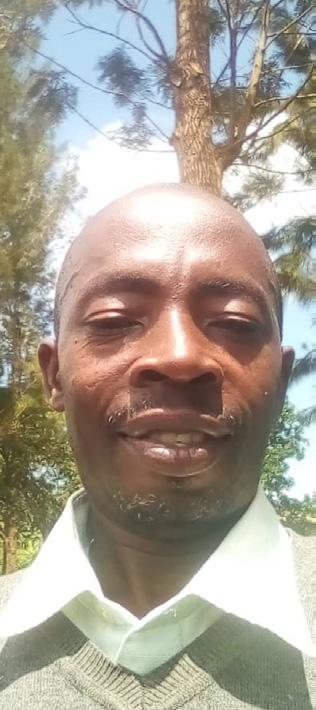
Aineamaani Davis openly admits that before the AWESOME Programme, he was not the kind of husband or leader who listened.
At 45, Davis describes himself as a man who once held firm to the belief that, as head of the family, every decision was his to make. His wife’s ideas were rarely considered, and all property and resources were managed solely by him.
“Before AWESOME, I was a dictator,” he says candidly.
“I could not allow my family members, especially my wife, to take decisions. But after the intervention, I learnt that decisionmaking is needed between me and my spouse. It has created peace and development in my home because my wife’s good ideas were not considered before.”
Through capacity-building sessions organised by FOWODE under the AWESOME Programme, Davis came face-to-face with new ideas about gender equality, partnership, and resource sharing in a family.
He learned about different forms of sexual and gender-based violence (SGBV), including mental, physical, psychological, economic, and sexual violence and the harmful cultural norms that fuel them.
“I also learnt that family resources belong to all family members,” Davis explains. “This has helped create different income sources and a sense of ownership and responsibility. It’s no longer all on me, and our family is more united.”
AWESOME didn’t just change Davis’s approach to his family life. It also gave him skills that shaped how he interacts with his community.
He was trained on advocating for women’s emancipation, challenging cultural norms, and engaging men in conversations about equality. These lessons quickly took root.
“Putting into practice what I gained from AWESOME, I became a role model in the community,” he says.
“Community members approach me for guidance and counselling. I was even appointed in my church as Sabafumbo (someone who leads and advises married couples).”
Davis’s understanding of women’s rights expanded far beyond theory. He began to actively bring men on board to support women’s participation in leadership, family business management, and household decision-making.
“When men allow women to lead in some areas, the whole family develops,” he says. “Women have good ideas that help both family and community growth.”
In his own home, the changes are visible. His wife now participates in running the family’s income-generating activities, and they make joint decisions about investments and expenses.
Despite these successes, Davis acknowledges that changing deep-seated norms is not easy.
Some cultural beliefs, particularly among certain cattle-keeping tribes, dictate that wives should remain at home and avoid outside work or exposure. Men who support women’s decisionmaking are sometimes mocked as being “bewitched” by their wives.
“Men also experience SGBV but keep quiet for fear of being identified and mocked,” he adds. “This silence increases their stress and sometimes even leads to death. There is still a lot to change.”
For Davis, one lesson stands out: involving men is key to reducing SGBV and protecting human rights. “When women are considered in decisionmaking, their contributions benefit the whole family and the wider community,” he says.
Additionally, Davis believes the way forward is clear: Increase sensitisation for men, through more community meetings, empower religious leaders to advocate for gender equality and normalize men’s participation in SGBV prevention and women’s rights campaigns.
From a quiet voice to a vocal youth leader
Eveylene Ayebale was aware of the many challenges women and girls in her community faced, but unsure how to effectively respond or speak about them.
Today, she walks into her district council with confidence, ready to debate policy, raise motions, and defend women’s rights from an informed position.
Thanks to the many AWESOME funded capacitybuilding sessions she benefited from, learning the skills that completely transformed her selfesteem and her ability to lead and advocate for the rights of women and girls.
“My esteem and public speaking skills drastically improved,” she says. “I can now articulate confidently on the floor of the district council and talk to youth during community meetings.”
One of the most significant sessions for her was a meeting attended by the Speaker and Clerk of the Council, where she was trained on the Local Government Act and rules of procedure. For Eveylene, understanding these processes was empowering.
“In this meeting, I learnt more about the Local Government Act, council rules of procedure and this also greatly helped me while in the district council sessions.
Now, when I speak in the council, it’s from an informed point of view. I’m not guessing, I’m certain about the prevailing situation on the ground,” says the youth representative.
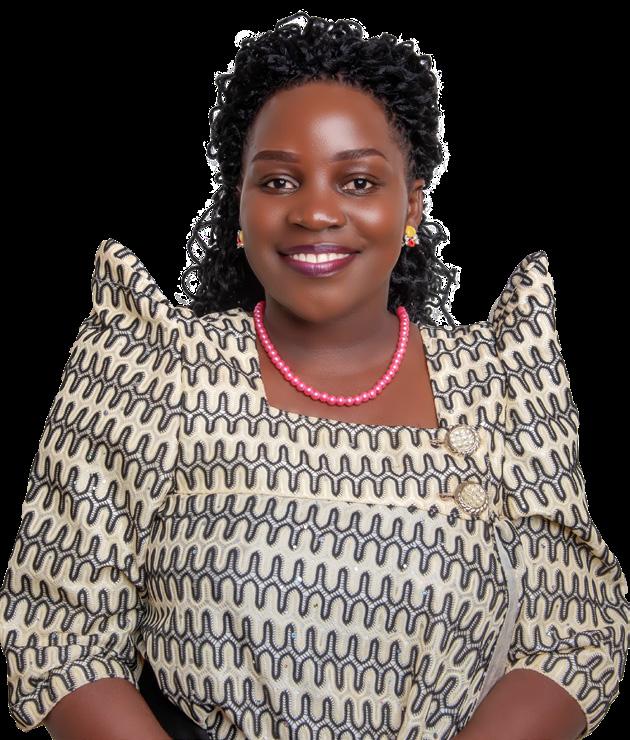
I realised the sky is the limit when it comes to women’s leadership.”
Eveylene adds that through different engagements, she was also able to learn and appreciate the importance of working together as a women’s caucus to raise issues affecting women and girls in the district council.
This exposure strengthened her belief in her own capacity to influence policy and drive change in her community.
Eveylene has taken her learning back to her community, particularly to youth groups. She now integrates sensitisation on SGBV into every meeting she attends, whether it’s a church service, burial, marriage celebration, or youth gathering.
Before AWESOME, she admits she did not fully understand the different referral pathways for SGBV cases.
Her advocacy, however, has not been without obstacles. In some communities, her work has been met with resistance. “There’s still a negative perception. Some men think I am teaching women to be rebellious,” she says.
Another challenge is the cultural tendency for parents to negotiate with perpetrators of serious crimes like rape or defilement, effectively denying justice to victims.
Additionally, Eveylene struggled with limited financial facilitation to reach distant communities for sensitisation campaigns.
But she has not given up. “ I continuously sensitise communities until mindsets begin to shift. I also use every available opportunity to speak even during events that are not specifically about women’s rights.”
Looking ahead, Eveylene believes that sustaining the gains of the AWESOME programme will require continuous community sensitisation to create deeper mindset shifts.
“Now, I can guide survivors on exactly where to report cases. This has enabled women and girls to obtain justice where before they would have been ignored.”
She also sees the need to introduce school-based programmes to reach schoolgirls who are often left out of community sensitisation meetings held during school terms. “If we engage girls early, we can empower them before harmful norms take hold,” she concludes.
Driving change from the ground up

Community members are embracing new economic opportunities in Lyantonde District. Women are leading income-generating projects, savings groups and local leaders are actively monitoring government services to ensure accountability.
Live changing initiatives are taking root in this district. In the midst of all these, is Councillor Namubiru Faridah, who is on the forefront pushing for gender-responsive service delivery.
Her life took a turn towards advocacy when she went through training offered by FOWODE under the AWESOME programme.
She says these training did not benefit her alone, but the entire community.
“Community members are now doing incomegenerating activities after having been trained under the AWESOME Programme.”
Faridah says. “People have joined saving groups and are developing their families.”
Councillors like her who benefited from the programme are now taking a more active role in legislation, oversight, and project monitoring.
Faridah, a member of the women’s caucus, works closely with fellow leaders to ensure that public resources are not only delivered but also used effectively.
“We have learned how to monitor the usage and effectiveness of government projects in our subcounties,” she explains. “This oversight has led to better results and more accountability.”
One of the most transformative aspects of the programme for Faridah has been a deeper understanding of women’s rights as human rights.
“After capacity building through AWESOME, I came to know in detail about women and human rights,” she says. “It is my role to raise women’s issues, teach them their responsibilities in families, and make sure GBV cases are addressed. We have been advocating for women and SGBV issues, and we are seeing change.”
The councillor however feels much more still need to be done despite the successes. “More sensitisation is still needed, especially in areas where the project hasn’t reached,” she stresses.
The journey with AWESOME has not only shaped Faridah’s work, but also her leadership style. She lists the most valuable lessons she has gained: Building strong cooperation with electorates and fellow councillors to advance shared goals, balancing political duties with family life and leading by example with integrity.
“As a leader, I have learned to be exemplary, and I appreciate Forum for Women in Democracy for the work they have done for us as Lyantonde District leaders.”
From policy oversight to community mobilisation, Faridah’s leadership reflects how the AWESOME programme is more than just training it is a catalyst for lasting structural change.
Freeing Ugandan women from sexual and gender-based violence...
A deaf woman becomes beacon of hope for her community
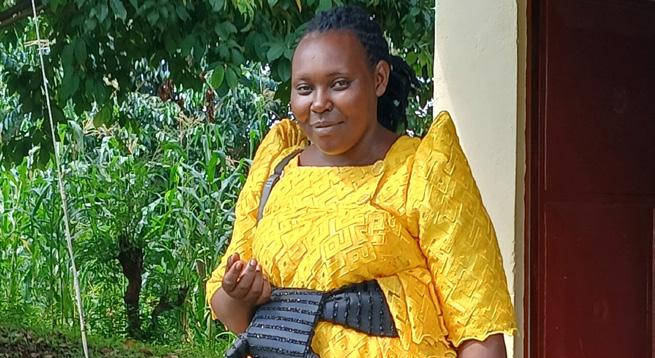
Asaba Nelda has quietly become a lifeline for women and girls in Bwijanga sub-county, Masindi District, who have suffered many years of silence, without a voice.
Nelda never knew one day she would be relied on by these women and girls to fight for their rights. But for women and girls’ survivors of violence, she is the difference between suffering in silence and being heard. “I’m neither a lawyer, nor a judge,” Nelda says humbly, “but people come to me now when something is wrong. They know I’ll help them find a way.”
This quiet authority and trust did not emerge by chance. It was cultivated through experience, hard lessons, and her involvement with the AWESOME programme and Forum for Women in Democracy (FOWODE) in Uganda.
Before the programme, Nelda was already active in her community, doing informal facilitation on local development issues. But she says it was through capacity-building sessions with the AWESOME programme that her work became deeply rooted in justice and women’s rights.
Through these sessions, she learned about how government structures work, how to monitor service delivery, and where survivors of sexual and gender-based violence (SGBV) can turn when systems fail them.
“I didn’t even know what a referral pathway was,” she admits. “I thought violence cases were just taken to the local chairperson. Now I know how the entire justice and welfare system functions and I help others understand it, too.”
Nelda has since assisted survivors in navigating complex and often intimidating justice and social systems. One of her most memorable cases involved helping a woman escape an abusive marriage by connecting her to the government’s Probation and Welfare Office for legal support.
“I was able to guide a woman who was always being aggressively beaten by her husband to the verge of death to the office of probation and welfare where she obtained justice. She was able to get her divorce settlement thus her life being preserved,”
Stepping into the political arena
Nelda’s story does not end with advocacy. Inspired by her growing knowledge and courage, thanks to the AWESOME programme, and the recognition she received in the community, she has now made the decision to contest for the position of Local Council 5 woman councilor in the upcoming elections in January 2026.
Her objective of getting in leadership is to influence decisions that affect women and girls and speak to the community needs. “I have gained the courage to join politics and contest. I want to improve on service delivery in my community and fight corruption.”
While her dream of elected office gains momentum, Nelda continues to serve her community every day.
She conducts on-the-ground monitoring in local health centres and schools to ensure service delivery, tracking what’s working or not. Additionally, she also supports survivors of domestic violence by walking them through their options even if that means accompanying them personally to local authorities.
This contribution has raised her profile in the community. People who once viewed her as “too outspoken” now call her when they hear of a case of SGBV. In some circles, she is seen as the “unofficial social worker” of Bwijanga.
Hated for her work
But not everyone was supportive at the start. She has faced verbal attacks and pushback.
“I have encountered a lot of hatred from public offices, especially those that are not ready to be transparent to the community during monitoring activities.
“Also, threats from relatives of GBV perpetrators that were imprisoned for their wrongdoing often labeling me as one against men,” says the rights champion.
Another unique challenge Nelda has faced is that individuals also expect money from her, especially during case management sessions.
How does she deal with these challenges?
“I usually give a deaf ear to those that insult me and the work I do, and with time, these people change their minds after seeing the results of my work.”
As the programme comes to an end, Nelda believes that its success lies not only in what it taught her, but in what it has sparked: a ripple effect of empowered women at the grassroots.
“We need more of this,” she says. “More facilitators. More districts. More women who can guide others, especially in rural areas where information is still lacking.”
She emphasises that continued mentorship, training, and exposure for women like her will go a long way in building sustainable change.






www.womankind.org.uk/project/awesome www.siiqqee.org www.ewdna.org www.fowode.org www.wcc.or.ke www.fidakenya.org
